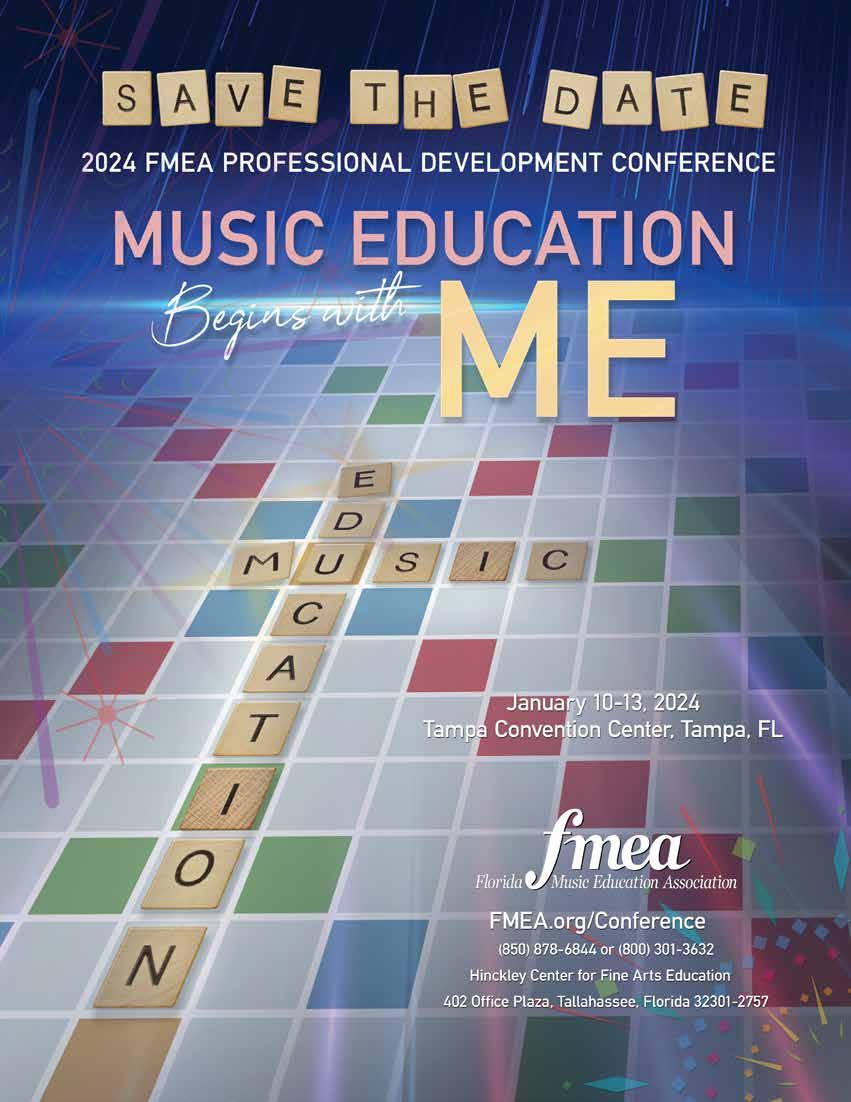Teacher Evaluation in the State of Florida
A Music Educator’s Perspective

Trauma-Informed Pedagogy in Music Education

PLUS: FSMALeadershipTraining
2023 Summer Institute
FMEA Steel Band Festival
JuneHinckleyScholarship
A LOOK BACK

Teacher Evaluation in the State of Florida
A Music Educator’s Perspective

Trauma-Informed Pedagogy in Music Education

PLUS: FSMALeadershipTraining
2023 Summer Institute
FMEA Steel Band Festival
JuneHinckleyScholarship
A LOOK BACK
The Yamaha Educator Suite (YES) gives you access to a wealth of professional development opportunities and resources. YES brings you into a network of like-minded colleagues, experts and professionals who want to share their real-world experiences. You’ll also receive valuable tips on advocacy assistance, program health support and much more. Let us help you raise the bar. Go to Yamaha.io/educatorsFMD2

Executive Director

Florida Music Education Association

Kathleen D. Sanz, PhD Hinckley Center for Fine Arts Education
402 Office Plaza
Tallahassee, FL 32301
(850) 878-6844 or (800) 301-3632 (kdsanz@fmea.org)
Editor-in-Chief
D. Gregory Springer, PhD Florida State University College of Music
122 N. Copeland Street Tallahassee, FL 32306 (850) 644-2925 (office) (dgspringer@fsu.edu)
Editorial Committee
Terice Allen (850) 245-8700, Tallahassee (tallen1962@hotmail.com)
Judy Arthur, PhD Florida State University, KMU 222 (850) 644-3005 (jrarthur@fsu.edu)
William Bauer, PhD University of Florida, Gainesville (352) 273-3182; (wbauer@ufl.edu)
Alice-Ann Darrow, PhD College of Music, FSU, Tallahassee (850) 645-1438; (aadarrow@fsu.edu)
Jeanne Reynolds (jeannewrey@gmail.com)
John K. Southall, PhD Indian River State College, Fort Pierce (772) 462-7810; (johnsouthall@fmea.org)
Advertising Sales Valeria Anderson (val@fmea.org)
402 Office Plaza Tallahassee, FL 32301 (850) 878-6844
Official FMEA and FMD Photographers
Bob O’Lary Amanda Crawford
Art Director & Production Manager
Lori Danello Roberts LDR Design Inc. (lori@flmusiced.org)
Circulation & Copy Manager
Valeria Anderson, (800) 301-3632 Copy Editor
w “Being able to scan for credit. Professionalism of clinicians and session speakers. Being able to download notes.”
w “Loved the speakers for general session and loved the diversity as well.”
w “I enjoyed the varied performances through the halls, and the drumming by Kalani was superb!”
Greetings, colleagues!
Wow! I must pause to express my utmost appreciation to members of the Florida Music Education Association (FMEA) and your students for your individual and collective roles in our 2023 FMEA Professional Development Conference in Tampa. So many kudos are to be extended to each of you. I especially would like to commend the FMEA staff in Tallahassee, under the leadership of Dr. Kathy Sanz, executive director. Your work behind the scenes is extraordinary.
Kudos to our outstanding Pre-Con panelists, Jason Locker (FMEA president-elect/facilitator), FMEA components, Conference Planning Committee, clinic presenters, Professional Development Committee, Student Conference Experience, Emerging Leaders, awardees, volunteers, conference hotels, Tampa Convention Center, City of Tampa, and all, as we build communities “One Note at a TIME.”
Special thank you to Dr. Steve Kelly, immediate past president, for your wisdom, thoughtfulness, and foresight as we

build a stronger association that meets the needs of all our members. You constantly remind each of us of our responsibilities and the importance of being effective music educators.

FMEA certainly plays a significant role in bringing together music teachers, allstate participants, corporate and academic partners, exhibitors, and community supporters to work collaboratively and strategically through an open and inclusive participatory process, shaping the future of music. The awesome clinics, performances, social events, and comradery revealed a substantive degree of common good that our association provided during a most difficult time in our lives as we continue to deal with COVID.
Here are some conference takeaways shared by our members:
w “Very enthusiastic general sessions, and a workout session to bring spirit to the atmosphere.”
w “Meeting the needs of our members and their students was a highlight.”
w “Self-care was a good value added element.”
Music connects different cultures, promoting diversity and growth. Music encourages creative thinking, discipline, leadership, and problem solving. And it’s a medium for individual and group expression—as Hans Christian Andersen said, “Where words fail, music speaks.”
The FMEA board knows there is still much work to be done as we celebrate our music teachers. To build our communities, we must continue to address the issues that cause barriers, whether policies, funding, access, inclusion and equity biases, parent involvement, schoolsite support, or other. We are challenged to ensure music’s existence remains inclusive in the classroom.
Consider the following in establishing worldly approaches to meeting your communities where they are and focusing their needs on multicultural and shared musical experiences:
1. The past cannot be changed.
2. Opinions don’t define your reality.
3. Everyone’s journey is different.
4. Overthinking will lead to sadness.
5. Your mentality shapes your reality.
You are eligible for membership in the Florida Music Education Association if you are an individual engaged in the teaching, supervision, or administration of music in elementary and secondary schools, colleges, or universities within the state.
Visit FMEA.org/membership to learn more about the benefits of active membership.
6. The present moment is all we ever have.
7. If you can’t be kind, at least don’t be unkind.
8. Failure will only be final if you QUIT.
9. The energy you give circles back.
10. The longest journey begins with the first step … Music teachers have the potential to encourage their students to engage in music at a variety of levels. Music as a subject allows for students to progress at their own pace and encourages students to achieve in a classroom dynamic and in ensembles with mixed abilities. I’m reminded of the LUCKY 7 Important Characteristics of an Excellent Music Teacher:
1. They have a genuine love for music.
2. They show a high degree of patience.
3. They know the value of fundamentals.
4. They get to know their students.
5. They’re lifelong learners.
6. They communicate well. And #7? Then we MAKE music through shared experiences.
Ultimately, it is our responsibility to ensure that music is provided in urban and rural settings, where in some cases children are not receiving music instruction due to multiple problems. There will be forthcoming professional development webinars, clinic presentations, and mental and physical health sessions. I wish everyone much success as your music programs commence their solo and ensemble activities as well as other music performance assessment (MPA) events.
I’ve learned that people will forget what you said, people will forget what you did, but people will never forget how you made them feel. –
Maya AngelouLet us all continue to study the language of music and how it influences communities! Continue to be amazing, everyone. I look forward to hearing from you as we make progress and build stronger music communities TOGETHER.
Shelby R. Chipman, PhD, President Florida Music Education AssociationDirect correspondence regarding subscriptions to: Hinckley Center for Fine Arts Education 402 Office Plaza, Tallahassee, FL, 32301-2757

Subscription cost included in FMEA membership dues ($9); libraries, educational institutions, and all others within the United States: $27 plus 7.5% sales tax.
The circulation of the Florida Music Director is 4,500 educators. Published eight times annually by The Florida Music Education Association, Hinckley Center for Fine Arts Education: 402 Office Plaza, Tallahassee, FL 32301-2757.
FMEA reserves the right to approve any application for appearance and to edit all materials proposed for distribution. Permission is granted to all FMEA members to reprint articles from the Florida Music Director for non-commercial, educational purposes. Non-members may request permission from the FMEA office.
Article and art submissions are always considered and should be submitted on or before the 1st of the month, one month prior to the publication issue to: D. Gregory Springer, PhD, dgspringer@fsu.edu. All articles must be provided in digital format (e.g., Microsoft Word). All applicable fonts and images must be provided. Images must be at least 300 dpi resolution at 100% of the size. All submissions must be accompanied by a proof (color, if applicable). Ads may be submitted via email to val@fmea.org
The Florida Music Director is made possible by the participation of the following businesses whose advertisements appear in this issue. They make it possible to provide you with a high-quality publication, and we gratefully acknowledge their support of our mission. We hope you will take special notice of these advertisements and consider the products and services offered. It is another important way you can support your professional association and the enhancement of Florida music education.
The publisher does not endorse any particular company, product, or service. The Florida Music Education Association (FMEA) is not responsible for the content of any advertisement and reserves the right to accept or refuse any advertisement submitted for publication. Information for advertisers (rate card, insertion orders, graphics requirements, etc.) can be found at FMEAMediaKit.org Florida Music Director reserves the right to refuse any ad not prepared to the correct specifications OR to rework the ad as needed with fees applied.
Yamaha Corporation of America............................................................ IFC
This advertiser provides additional support to FMEA members through membership in the Florida Corporate and Academic Partners (FCAP) program. FCAP partners deserve your special recognition and attention.
Thiscolumn is written to express my profound gratitude to colleagues who stepped up when I needed to step away.
It was Thursday, January 12, and I was soaking up the positive vibe of Dr. Chipman’s first general session. I was very excited about the 2023 conference and the great sessions to come, as well as looking forward to seeing so many FMEA family members, friends, and colleagues. I was being blown away by the energy from the FAMU band when I noticed several calls appearing on my silenced cell phone. The calls were not good. Minutes after the session ended, I learned that my motherin-law had suffered a massive stroke and was not expected to live long. In fact, she did pass away several days later.
Knowing I needed to leave Tampa immediately to be with my mother-in-law and my husband, I had just a few minutes to plan for my three advocacy sessions.
Jeanne W. Reynolds Chairperson Government Relations Committee
The easiest thing to do would have been to cancel them. Interestingly, that thought never occurred to me because of our extraordinary FMEA family, and specifically my amazing colleagues on our advocacy committee.
Debbie Fahmie and Sondra Collins did a masterful job at the session entitled “Uniting Administrators and Music Educators to Build High-Performing Schools.” As awards chairperson, Sondra helped secure the award-winning administrators for this panel, and Debbie facilitated the session beautifully. Thanks to David Alfonso, 2023 Administrator of the Year; Dr. Peggy Johns, 2023 School Board Member of the Year; Kim Annis, recipient of the 2023 FMEA Leadership Award; and Dr. Kelly Paduano, 2021 Administrator of the Year, for sharing their expertise with our members, and special thanks to Debbie Fahmie for stepping in for me.

Where
Matters Most” was the session our advocacy committee developed to resonate with all FMEA members. Building outstanding programs is the strongest advocacy tool because building excellent programs is what every good music teacher strives to do. I was very disappointed not to have experienced the brilliance of Kevin Ford, Vivian Gonzalez, and Scott Sheehan. I am still amazed and so grateful they agreed to present at this session. And there are not enough words to thank my friend and colleague Ajori Spencer for managing this session and conversation so brilliantly. As he always does, Ajori did his homework late into the evening the night before to be prepared.
Our visionary leader FMEA PresidentElect (elect) Scott Evans stepped in to facilitate the innovative advocacy session “Building Stronger Communities by
Running for Office.” Scott worked hard pulling this session together throughout the fall as we prepared for the conference. He secured two of the elected officials to present. Scott is brilliant on all government relations and advocacy issues. I am still so grateful that Florida Representative Anna Eskamani, Florida Representative Johanna López, and school board member and FSMA President Jane Goodwin agreed to present at this session. And I am especially grateful to Erin Dunne, our choral colleague who ran for the Brevard County School Board, for presenting and inspiring us with her story. I had looked forward to this session and was very happy and relieved when Scott agreed to manage it.
There are so many who stepped up for me—special thanks to Alice-Ann Darrow who took over my Hall of Fame duties; Lisa Lehmann for acting as my guardian angel ensuring I got home safely; and Val Anderson, Kathy Sanz, and the entire FMEA staff for all the help and support. And I need to give a shout-out to the entire FMEA Government Relations Committee, Corey Alexander, Anthony Atkinson, Andrew Burk, Sondra Collins, Beth Cummings, Alice-Ann Darrow, Annabelle Echevarria, Scott Evans, Debbie Fahmie, Vivian Gonzalez, Izzi Guzzman, Angela Hartvigsen, Bernard Hendricks,
Jason Locker, and Colin Urbina. After working so hard preparing for those advocacy sessions, I must admit I was terribly disappointed to miss so much of the 2023 FMEA conference and I was so grateful to be with my mother-in-law during those last few sacred days. Both things are true. By leaving, I was also reminded and reassured that I can be replaced. That is such a gift. The work goes on. And in fact, that is what good advocacy and good organization
As I write this article, the song Grateful by John Bucchino (sung by Billy Porter) plays over and over in my head. You can listen to it on .


I’ve got a heart that can hold love
I’ve got a mind that can think There may be times when I lose the light
And let my spirits sink
But I can’t stay depressed
When I remember how I’m blessed
Grateful, grateful
Truly grateful I am
Grateful, grateful
Truly blessed
And duly grateful
are all about. Advocacy is a team effort. And we are going to need every FMEA member to be part of the team for the 2023 Legislative Session, which runs from March 7 through May 5.

The 2023 Legislation Session is going to be a wild ride. Watch for all updates and eblasts. Be ready to step up just as Debbie Fahmie, Ajori Spencer, Scott Evans, AliceAnn Darrow, and Lisa Lehmann did for me when I needed them.
Truly I am so grateful for everyone who stepped up when I needed to step away. And I am grateful to all of you who will step up over the next few months for music education.
Please take time to thank and support our 2022-2023 Academic Partners.

University of Central Florida

Cannon Music Camp - Appalachian State University
Florida Southern College
Rollins College Department of Music

St. Thomas University

University of North Florida

University of North Texas
University of Tampa
Valdosta State University

Partners as of February 17, 2023.
*Please visit FMEA.org/partners for partnership details or call 850-878-6844.


About the Training:
The aim of state and district leadership of our component organizations (FBA, FOA, and FVA) is to provide excellent stewarding of existing music programs, as well as the championing of better opportunities for aspiring musicians. This requires leaders to be efficient organizers of persons, resources, and projects, in addition to being able to plan paths to fulfilling the vision of a better tomorrow for music education in Florida.
This professional development opportunity will provide communication training, team building, scenario-based problem-solving, technology, laws relating to music education, and other skills identified by participants as a need to find success as a leader in Florida.
Schedule Overview:
w Sunday: Arrival and orientation, possible evening activity.
w Monday and Tuesday: Full days of sessions and activities, with social activities in the evenings. Meals provided.
w Wednesday: Final session will be finished by 11:00 a.m. (Subject to change; More details will be forthcoming.)
Date and Location
July 16-19, 2023
Renaissance Orlando at SeaWorld Orlando, Florida
Application Deadline
April 1, 2023
Limited Participation and Cost
Approximately 16 to 20 participants will be selected through an application process. Hotel expenses and meals will be covered by FSMA during the training.
The training is designed in partnership with the FSMA component organizations: Florida Bandmasters Association, Florida Orchestra Association, Florida Vocal Association.
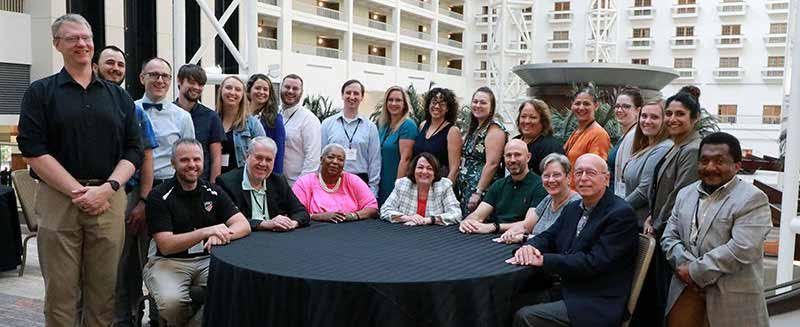

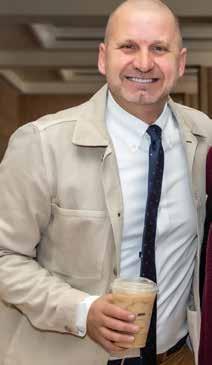



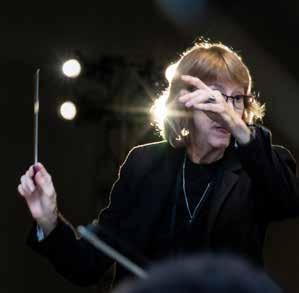
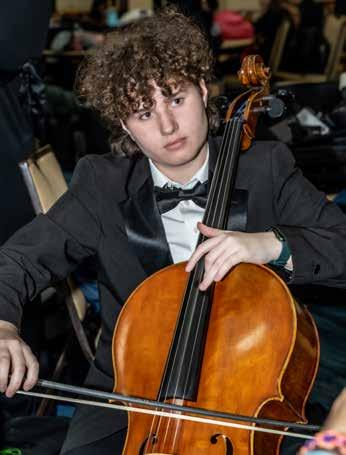
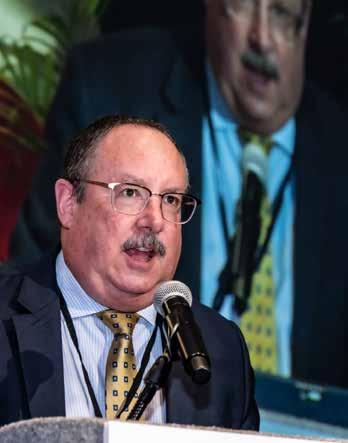
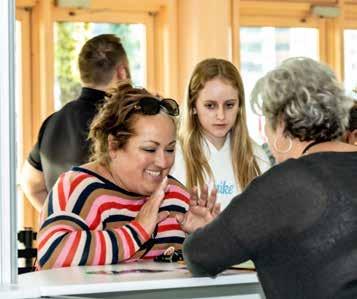




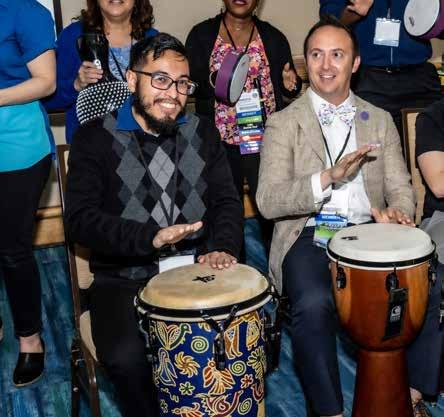





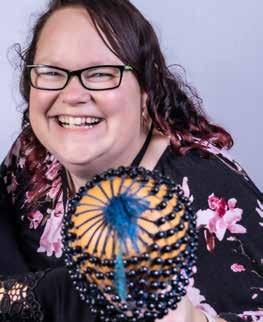
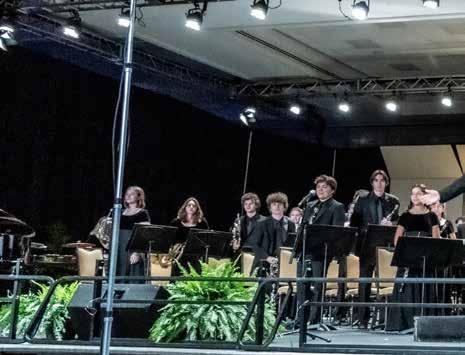






 Official FMEA and FMD Photographers
Official FMEA and FMD Photographers
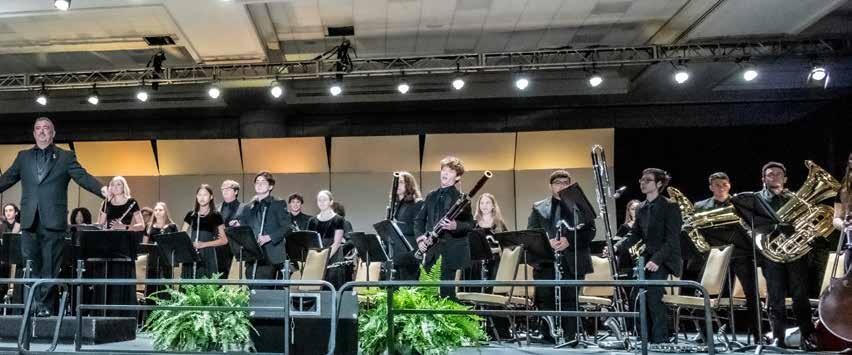

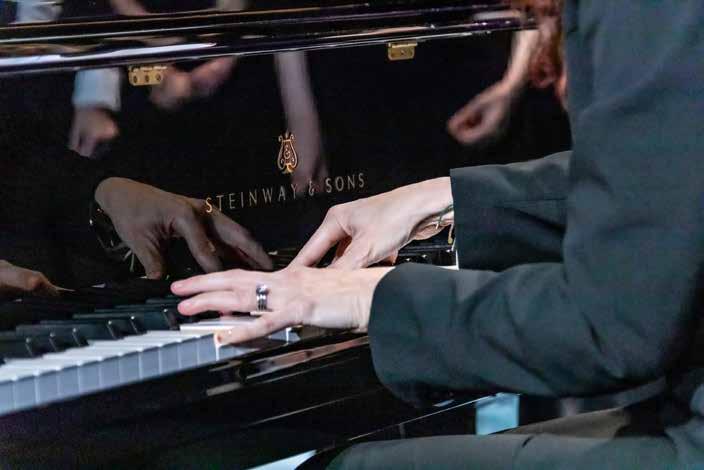





This prestigious award honors individuals for outstanding contributions over an extended period of time to music and education in Florida, as well as throughout the nation.
2023
HALL OF FAME INDUCTEEJudy Bowers, PhD, professor emerita in the College of Music at Florida State University, retired and then completed four years of holding the Biedenharn endowed chair in music at the University of Louisiana, Monroe. At ULM, she led a curriculum revision for the undergraduate music education degree programs and established a three-summer MME program for practicing teachers. Currently under development is CHOIR TALK, an online tool with resources and mini-classes designed for updating choral teaching strategies. Throughout her career in music teacher preparation, Dr. Bowers has taught undergraduate and graduate classes for music education, and she conducted the Women’s Glee Club at FSU and the newly formed Bayou La Belle at ULM. A unifying principle across her work in all settings is Developmental Teaching, an approach that allows singers of varied skill levels to successfully rehearse and perform together in music ensembles.
A belief that the teaching/learning process is a collaborative act has led Dr. Bowers to create multiple partnerships that enrich learning opportunities for university students while also providing positive changes for the school and community partners: Adopt-A-Choir, a high school/university connection for one concert during one semester; Raa Singers, part of a before-school program pairing university students with urban middle school students for multiple choral and instrumental classes; and MTC Glee, a choir pairing FSU students with women housed in a correctional facility. Dr. Bowers contributes to music teacher professional growth through presentations, publications, interest sessions, and school in-service; she models the choral pedagogy she teaches when conducting all-state and honor choirs in the United States, Canada, and Africa. In June 2014, Dr. Bowers was named a Lowell Mason National Music Education Fellow and was inducted into this society by the National Association for Music Education in Washington, D.C.
Itis my great honor to introduce our 2023 FMEA award winners. The FMEA Award Program recognizes the efforts and accomplishments of exemplary music educators, school and district administrators, businesses, music programs and projects, and others who have made an outstanding contribution to music education. Their efforts help FMEA attain our mission of promoting a quality, comprehensive music education in all Florida schools. Please applaud these individuals, as well as all the awardees that came before them, as we strive to showcase exemplary music education throughout our state. As you read about the 2023 FMEA award winners, you may have exemplary music educators, administrators, businesses, or programs and projects come to mind. Please remember them when next year’s nomination period begins this spring and nominate them!
Congratulations to all our 2023 FMEA awardees! We honor you and thank you for your commitment to quality and comprehensive music education for ALL, in ALL schools.
The FMEA Music Educator of the Year designation is awarded to the music educator who has served their students, community, and profession in an exemplary manner. This award recognizes outstanding merit in music teaching. The recipient must have demonstrated notable achievement as a music education professional for 10 or more years, and must have demonstrated continued contributions/commitment to the profession and to FMEA/NAfME.
Ernesta Chicklowski
Roosevelt Elementary School
Hillsborough County Public Schools
Nominated by Meghan Alfaro on behalf of FEMEA
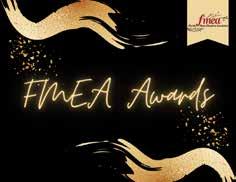
Ernesta Chicklowski holds the BME from Florida State University and the MA from the University of South Florida and is nationally board certified. She is a music teacher at Roosevelt Elementary School in Tampa.
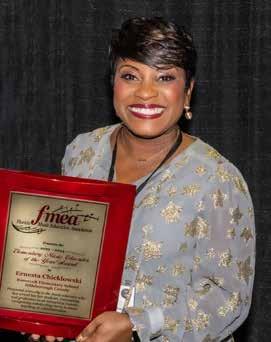
Mrs. Chicklowski is a highly soughtout clinician for music education, arts in education, and teacher trainings and workshops. She has presented at national conferences, including Midwest Band Clinic and

Orchestra Conference and Ohio State University. Ernesta has also served as a clinician for all-county chorus events in the Tampa Bay area.
With 21 years’ teaching experience, she was awarded Teacher of the Year in her school in 2002 and 2011. Additionally, she was named Ida S. Baker Educator of the Year for Roosevelt Elementary, an award given to an individual who embodies the pioneering spirit of Ida S. Baker by going above and beyond to meet the needs of diverse student populations. In 2014, Ernesta was named Hillsborough County Schools Teacher of the Year. This year, Ernesta was named a quarterfinalist for the 2023 GRAMMY Music Educator Award.
Mrs. Chicklowski serves her local community both in and outside of school. She has served as president of the Hillsborough County Elementary Music Educators Council, and in addition to her work as an elementary music educator in Hillsborough County Public Schools, she is the founder and owner of the Studio of South Tampa, a music and theatre school specializing in private continued on page 16
continued from page 15
lessons and group productions for school-aged students. Mrs. Chicklowski has served elementary music at the state level as FEMEA president from 2020 to 2022. Prior to this role she served as FEMEA District 3 chairperson for four years. She was an FMEA Emerging Leader and has served the state organization yearly as a session coordinator at the January conference. Ernesta Chicklowski has dedicated her life to service in music education at the local, state, and national levels.
Steve Kelly, PhD, professor of music education at Florida State University and past president of FMEA, states: “Ernesta is simply among our very best in so many ways. Her energy is contagious, her creativity is amazing, and her musical skills are of the highest quality. But to be the FMEA Elementary Music Educator of the Year requires her to be the VERY best teacher. Ernesta meets this most important qualification hands down. I have had the pleasure of witnessing her students and her skills firsthand and have seen the impact she has on all of her students.”

Vivian Gonzalez
Miami Arts Studio 6-12 @ Zelda Glazer
Miami-Dade County Public Schools
Nominated by Nerissa Manela
Vivian Gonzalez is a proud product of Miami-Dade County Public Schools Magnet Programs and community music organizations, as well as a proud product of the FMEA All-State experience. Vivian teaches as the orchestra magnet director at Miami Arts Studio 6-12 @ Zelda Glazer (MAS), grades 6-12. The orchestra at MAS was created to give access to students who otherwise would not be able to enter a strings program. Here she has successfully created the largest and arguably one of the most prestigious 6-12 grade orchestra programs in the district. In fact, in 2022 her students made up 20% of the entire Superintendent’s Honors Orchestra and were among the strongest players in the orchestra.
Before Miami Arts Studio, Ms. Gonzalez taught at Southwood Middle School, where her students regularly made up a significant portion of the Superintendent’s Middle School Honors
Orchestra, as well as All-State, and her group regularly received straight superior ratings at MPA. Vivian then went on to South Miami K-8 leading an elementary music magnet program, which included choir, steel drum ensemble, modern band, and strings. Ms. Gonzalez held the largest feeder to all three South Miami middle school music programs. She raised the performance level of her middle school students who then continued in orchestra all the way through high school.
Ms. Gonzalez has presented at numerous state and national conferences on the topic of including special learners in the music classroom including the National Association for Music Education, American String Teachers Association, Little Kids Rock Modern Band Summer, and FMEA. She has served as the NAfME IN-Ovations Council southern representative, the FL-ASTA president, FEMEA District 1 chairperson, and FOA 7/8 all-state coordinator, and was a member of the editorial committee for the International Journal of Music Education: Practice.
Ms. Gonzalez was most recently recognized as a 2022 National Music Teacher of Excellence by the Country Music Association Foundation, was recognized with the 2018 Give a Note Foundation Music Education Innovator Award, was recognized as a featured teacher for the White House Initiative for Educational Excellence in Hispanic Education Spotlight, was the Magnet Schools of America 2016 Region 3 Teacher of the Year, was a 2014 GRAMMY Music Educator Award top-ten finalist, was a 2014 FL-ASTA Studio Teacher of the Year, and was a winner of the 2013 Lady Antebellum 7FOR7.
Kasia Bugaj, PhD, associate professor of string music education at Florida State University and past president of the Florida chapter of the American String Teachers Association, states: “When you look over her resume, Vivian has done many different things in her career— some rewarded monetarily, some most simply because they needed to be done and Vivian stepped up to the plate. Vivian is one of the best advocates for her students that I have seen. But not just for her students—for anyone in her sphere of influence, be it preservice teachers, colleagues in the profession, or members of organizations in which she leads; she recognizes the good in people and lifts them up. Vivian Gonzalez is one of the most dedicated teachers and dedicated people I know.”
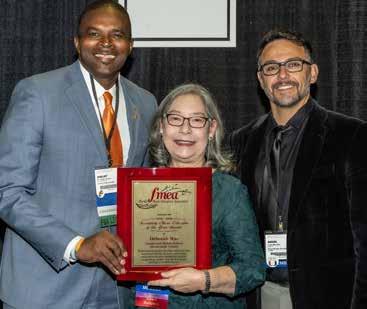
Deborah Wong Mar
Southwood Middle School
Miami-Dade County Public Schools
Nominated by Angel Marchese on behalf of FVA

Deborah Wong Mar has been a music educator in Miami since 1977. Her choral studies began at Barry University, with the BA in music education. She went on to complete the MM in music education at the University of Miami and is working on doctoral studies in music education at the University of Miami. While teaching, she completed national board certification in 2003.
Mrs. Mar’s extensive teaching experience includes middle and high school. Deborah began teaching at her alma mater, North Miami Beach Senior High, teaching concurrently at John F. Kennedy Junior High. In 1989, she began teaching at Miami Southridge Senior High. Deborah has been choral director at Southwood Middle School since 2004. Choirs led by Deborah Mar perform at schools, county events, nursing homes, Nutcracker Ballet, and the South Florida Youth Symphony. With her leadership, her choirs have consistently received superior ratings since 1983. In 2017, the Southwood Middle School Choir was one of the first middle schools to be awarded superior with distinction honors, and her choirs have earned this honor every year since. Her students have participated in Young Voices Festival, Music in the Parks, and MusicFest. Her choirs were Grand Champions in 2005-06 at MusicFest in Orlando and in
2007-08 at Music in the Parks. Since 2014, spring choir trips have become a hallmark of Mrs. Mar’s legacy, which includes community service and master classes with professors at UCF, UNF, UT, and FAU. Whether volunteering at Clean the World, organizing book drives, growing plants for the Fairchild Challenge, or filling a bus with donations for Ronald McDonald Houses, her students put their love for music into action.
Deborah has demonstrated exemplary leadership in schools, professional associations, and her community. She was department chair at North Miami Beach and Miami Southridge. Deborah has served as FVA middle school all-state chairperson, two terms as an FVA District 16 chairperson, and FVA adjudicator, and now serves as FVA MPA chairperson. A frequent guest presenter, Deborah has shared her teaching expertise for numerous FMEA conferences as well as in Maine and in Pinellas, Brevard, Santa Rosa, and Miami-Dade counties. Presentations focused on Music Literacy Through the Use of Solfeggio as well as Music of Asian Studies. She has conducted honor choirs in Miami, Broward, Palm Beach, and Santa Rosa counties. Interns from FSU, FIU, and UM have benefitted from her guidance as mentoring young teachers has been a significant part of her legacy.
Deborah was named Teacher of the Year at Miami Southridge Senior High in 2003, Teacher of the Year at Southwood Middle School in 2019, and Teacher of the Year of the MDCPS Region VI. She has been awarded grants by the Education Fund for Music Literacy and Music of Holocaust Remembrance. In 2017, Deborah was inducted into the FVA Hall of Fame.
J. Mark Scott, executive director emeritus of the Florida Vocal Association, states: “Deborah is a role model for our profession. Students who sing under her leadership are challenged, inspired, and encouraged. They leave her classroom with a great knowledge of music and vocal technique, which will serve them throughout life, as well as the impact of a caring and loving teacher. Deborah Mar represents the best of Florida music educators.”
continued on page 18
continued from page 17

The FMEA College Music Educator of the Year designation is awarded to the college music educator who has served their students, community, and profession in an exemplary manner. This award recognizes outstanding merit in college-level music teaching. The recipient must have demonstrated notable achievement as a music education professional for 10 or more years, and must have demonstrated continued contributions/commitment to the profession and to FMEA/NAfME.
Peter Steenblik, DMADirector of Choral Activities, University of West Florida
Adjunct Professor of Music, Pensacola State College
Artistic Director, Choral Society of Pensacola
Nominated by Elizabeth Phillips on behalf of FVA
Dr. Peter Steenblik is director of choral activities at the University of West Florida, artistic director of the Choral Society of Pensacola, and adjunct professor of music at Pensacola State College. Past appointments include chorus master for the Pensacola Opera, director of the Women’s Chorus at the University of North Texas, and director of choirs at Jordan High School (Salt Lake City).
Dr. Steenblik holds the DMA in choral conducting from the University of North Texas, the MM in choral conducting from the University of Utah, and the BM degree in choral education from the University of Utah.
Dr. Steenblik is an internationally known adjudicator and clinician. He has served as the head of choral activities for the Utah Music Educators Association and on the Utah ACDA Board. Prior to joining UWF, his previous choirs have performed with the Mormon Tabernacle Choir, Utah Symphony, Ballet West, and the Women’s Chorus of Dallas.
Dr. Steenblik joined UWF in 2015 and quickly became an influencer of choral music in Florida. The UWF Choir has performed with the Pensacola Opera, the Pensacola Symphony Orchestra, and at the ACDA Southern Division Conference with the Mobile Symphony. The UWF Choir was most recently featured at the 2022 Florida ACDA Conference. Lio Irby, a UWF music education graduate, states, “Dr. Steenblik pushes students to be the best possible versions of themselves. He expects great things while being patient, understanding, and compassionate.”
In 2020, as the interim artistic director of the Choral Society of Pensacola, Dr. Steenblik guided the CSOP through the COVID pandemic, developed data-based safety protocols, and led the ensemble as they persevered to prepare three public performances. In 2021, he was named CSOP’s artistic director. Regarding Dr. Steenblik’s leadership, CSOP Executive Director Charlie Smoke, stated, “In just one year, he has completely transformed the organization, elevating the quality of our singing and strengthening our sense of community.”
Dr. Steenblik is always willing to serve our choral community, as recognized in his receiving the 2022 FVA Service Award. He has given workshops at FVA, FMEA, and ACDA conferences. Though he is in demand as a clinician and adjudicator, he is always willing to visit a local high school to lend a helping hand.
Jeannine Stemmer, FVA president, states: “From the very first day I met him, I witnessed a gentle, compassionate soul who was ready and willing to serve in any capacity for the good of music education. He is intentional, passionate, and empowers those around him.”
And Alex Gartner, artistic and executive director of the Pensacola Children’s Choir, states: “In private conversations, Dr. Steenblik’s colleagues have repeatedly lauded his work for the choral community. As a partner in that same community sphere, I am continually grateful to count him as a trusted colleague in this important work. But perhaps even more importantly, as anyone who is lucky enough to call Peter a friend would likely agree, Peter’s heart for choral music extends far beyond the podium or any classroom. He embodies the collaborative and nurturing spirit that is deeply ingrained in this art.”
The FMEA Administrator of the Year designation is awarded to a school administrator who is not a professional music educator, but who displays ardent support of the school music program. This award recognizes leadership, excellence in encouragement, and promotion of music education in Florida schools. The recipient must have demonstrated significant efforts in support of music education resulting in awareness or enhancement of the school’s music program and allocation of resources, as well as serving as an active administrator for 10 or more years.
 David Alfonso
David Alfonso
Nominated by Joshua Velez
David Alfonso is the proud principal of Palm Beach Lakes High School, a large urban comprehensive high school in the School District of Palm Beach County. His journey to his current leadership role has been 29 years in the making.
He started as school age childcare director and decided education was his passion. After graduating from Florida State University, Dave began his professional career as an elementary school teacher. After only four years, his peers nominated him for the prestigious Dwyer Teacher of the Year award. His excellence was awarded with a prized finalist position. After leaving the classroom, Alfonso became an assistant principal at Heritage Elementary School in 2000. His diligence as an administrator was rewarded by earning his principalship at Frontier Elementary in 2007. Mr. Alfonso then moved on to head Osceola Middle School, which prepared him for his supervisory roles as West Area director and then the Area 4 director. As the Area 4 director, Alfonso championed literacy in the elementary schools by authoring a $3 million grant to support all of the area’s low-performing elementary schools. He worked in the capacity of director for five years until he was approached by the superintendent to take the helm of the struggling Palm Beach Lakes High School. Mr. Alfonso did not hesitate before agreeing to accept the position.
In his tenure as principal of Palm Beach Lakes High School, David Alfonso has elevated the academic progress and entire morale of the school. He is not a prideful leader, which is proven in his viral “Principal Dances at Homecoming Pep Rally,” which his students absolutely adored. Dave has also been seen at the outdoor pep rallies dressed as the school mascot. He is dedicated to everything that is Palm Beach Lakes High. One of his passion projects at the school is supporting the Ram Regiment Band in becoming the premiere program in the state of Florida. He has secured funding for many of the band’s needs to do so. One of his first actions was to create an artist-in-residence position, which added even more focus to the level of student performance. Dave soon noticed the band needed to update their equipment. Since becoming principal, he has allocated over $75,000 in funding for instruments alone. This past year, Mr. Alfonso has set aside almost $60,000 for new band uniforms. His dedication and support of the PBLHS Ram Regiment Band is unparalleled. One might say he is their biggest fan.
Joseph Lee, EdD, instructional secondary superintendent of the School District of Palm Beach County, states: “Without the guidance and vision of Mr. David Alfonso, Palm Beach Lakes would not look as polished as it does, perform at the academic level it currently has achieved, and definitely would not sound as exceptional as it does each time they head out the door to enthrall another audience of fans.”
continued on page 20
continued from page 19
The FMEA School Board Member of the Year designation is awarded to a Florida district school board or an individual school board member who has demonstrated support for and commitment to high-quality music education throughout the school district. This award recognizes excellence in leadership, encouragement, and promotion of music education in Florida schools. The recipient must have demonstrated a significant contribution in support of music programs/curricula in the district’s schools, and must have demonstrated evidence of districtwide policies and long-range plans for music education at all levels, as well as demonstrated evidence of equitable access to music programs across all grade levels including financial support of music instruction in the district.
Peggy Jones, EdDNominated by Sherry St.Petery on behalf of FEMEA
Dr. Peggy Jones has been involved with the School District of Indian River County since 1980. Since 2020, Dr. Jones has served on the School Board of the School District of Indian River County and currently serves as the vice chairperson.
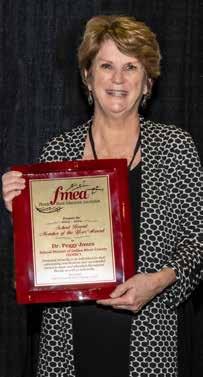
Having earned the BS degree from Illinois State University, the MS in educational administration from Northern Illinois University, and the EdD from Nova Southeastern University, Dr. Jones is no stranger to education and educational leadership.
As a school board member, Dr. Jones consistently supports music and arts programs throughout the district. Dr. Jones is a devoted advocate of the importance of including the arts in school curriculums, elementary through secondary level, and her active support and encouragement serve as a role model for educators, parents, and the community to continue supporting its music programs. She has students and teachers at
the forefront of her decision-making, believing that participation in activities like music is one of the reasons students succeed in school.
Prior to being elected to the Indian River County school board, Dr. Jones was a teacher, coach, and principal. As a principal she was a constant supporter of the music programs in her schools. During her entire career she has stayed true to her belief that, “students need to find that niche which builds relationships to feel like they are part of a team or program. There is much research out there about students becoming involved in any activity, and it shows that students who do this are more academically successful.” She believes this because she witnessed it for close to 50 years. As Dr. Peggy Jones herself states, “Build those programs where students can feel successful, and they will come.”
Sherry St.Petery, FEMEA District 7 chairperson, states: “School board members have come and gone, but Dr. Jones gets to know all of us. She visits our schools; attends performances; and stops and talks with teachers, students, and parents. During school board meetings she keeps the focus on what is best for kids and makes sure that music programs are supported throughout the district. She consistently shows, with her actions, that these programs are important and works hard to encourage all to support the music programs in our district. She is a hero to students and art teachers in our district.”
The FMEA Leadership Award is presented to an individual who demonstrates outstanding and sustained skill in a leadership or an administrative capacity and who carries the mission of the FMEA forward throughout the state and/or the nation. The recipient must have demonstrated notable achievements as a leader in promotion of music education and a continued commitment to the profession. The recipient must have served a minimum of eight years in a leadership or administrative capacity and employed in their current position for five years.
Kimberly AnnisNominated by Pauline Latorre on behalf of FEMEA
Kimberly Annis is a product of the Miami-Dade County Public Schools. She received the BM degree with a major in music education from the University of Miami in 1989 and the MS in secondary music from Florida International University in 1997.
Ms. Annis’s 33-year teaching career began in 1990 in MiamiDade County, first as an elementary music teacher and then as a middle school band and orchestra teacher. During her summers she taught music at a school for students with special needs. In 1999, she moved to Broward County and spent 18 years at Walter C. Young Middle School where her programs received many accolades and continually received superior ratings at local MPAs. While in the classroom, Ms. Annis served her colleagues in many important ways. She served in several leadership positions, including as president and secretary of the Broward Music Education Association and president of the Broward County Orchestra Directors Association.
In 2017, she moved from the classroom to the Broward District Music Office, where she now continues to serve as the instructional facilitator for music and performing arts. In her capacity as the instructional facilitator, Kim works very closely with all the Broward County music teachers. Ms. Annis is a mentor to all music teachers K-12 and focuses on mentoring the new teachers in the county, developing a relationship with each music teacher. In addition to working closely with teachers, she is tasked with developing professional development opportunities for teachers. Kim communicates with teachers, identifying their needs and relevant professional development (PD) topics, and then writes the PD content and works with presenters to help them understand how to present the material. She also creates content for teachers on Broward’s Canvas online platform. She has developed hundreds of lessons for every grade level and every musical subject, along with a vast library of lessons and resources that are made available to all the Broward County music and performing arts teachers. She also supervises all four of the all-county music events, as well as supports all the FMEA organizations in Broward County by helping at their auditions and events. She even enjoys helping the community by volunteering to play her oboe at various church and synagogue celebrations.
Joseph Luechauer, K-12 music and performing arts curriculum supervisor for Broward County Public Schools, states: “Kimberly Annis does a wonderful job of instructing teachers and providing positive feedback without making them feel uncomfortable or intimidated. She works very hard to first develop positive professional relationships with teachers, building trust. … I have known Ms. Annis for more than 25 years. I have worked with her closely for that same amount of time. She shows initiative, leads by example, and produces quality work. She is a great example of what the FMEA Leadership Award stands for.”


The FMEA Distinguished Service Award is presented to persons or organizations inside or outside the field of professional music education. This award recognizes exceptional service to or support of music education. The recipient(s) must have demonstrated noteworthy contributions to music education with statewide impact preferred.
Nominated by Andrea Lange on behalf of FVA
Jo Hagan, a certified public accountant, serves both the Florida Vocal Association and the Florida Bandmasters Association as their business manager. Mrs. Hagan serves both the FVA and FBA as not only the manager of state and district business accounts, but as a financial advisor that keeps the associations on the right financial path.
Jo Hagan is also the visionary and founder behind Barefoot Accounting, PA. Jo has a degree from Auburn University with a continued on page 22
continued from page 21
major in finance and a minor in accounting, and in 1998 earned her CPA. With the need for flexible employment to care for her two young children, Jo decided to become an entrepreneur and started her accounting practice. In 2002, Barefoot Accounting became incorporated, and soon after Jo and her family relocated to Jacksonville, Florida. As time passed, her children grew, and her business evolved to support others heading down a similar path of balancing work and family life. As a mom, wife, and business owner, Jo can relate firsthand to the struggles of starting a business, growing a business, relocating, and reestablishing a business—all while raising a family. Jo’s passion is centered on helping people understand—and use—their financial resources to be successful in both life and business.
Mrs. Hagan has been the business manager for the Florida Vocal Association for over the past 10 years. As such, she has established a procedure for all financial dealings within the organization. Jo has transformed the way the FVA manages and spends its funds, innovating and researching methods to make the jobs of the district chairpersons and FVA Executive Board more manageable. Ms. Hagan communicates with all shareholders of the organization to ensure the day-to-day and year-to-year functions are fiscally responsible.
Jeannine Stemmer, president of the Florida Vocal Association, states: “Jo Hagan goes above and beyond the call of duty and is available to us when we need her. She has helped to organize and streamline the financial processes of our organization. It is an honor to recognize Jo for her outstanding commitment to music education in the state of Florida.”
And J. Mark Scott, executive director emeritus of the Florida Vocal Association, agrees: “Jo Hagan is helpful beyond the scope of her obligations. Her genuine concern, for the association and the people she serves, makes her an outstanding choice for this award.”
The FMEA Exemplary Model Music Program designation is awarded to an individual or group for a meritorious, exemplary, or innovative program completed in the field of music education. This may include an exemplary model and/or innovative music education program that provides or continues to provide a significant, positive impact on students, music educators, and/or the state/community.

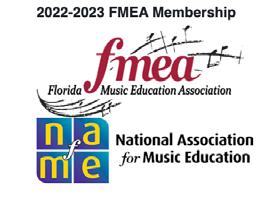
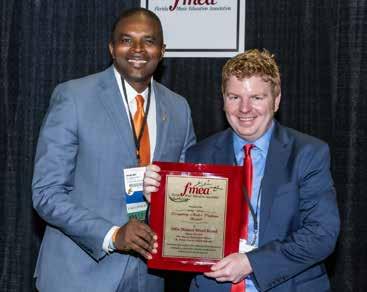
The Otis Mason Steel Band began at Otis Mason Elementary School in 2019, when director Shaun Bennett moved back to his hometown of St. Augustine and brought his knowledge of steel band to the St. Johns County Public Schools. This elementary steel band helps provide an after-school activity for children at Otis Mason Elementary and allows them to experience playing in a real steel band with full-sized Caribbean steel pans and various percussion instruments. Otis Mason Steel Band is the only
steel band in St. Johns County and one of the only elementary steel bands in Northeast Florida.
The primary focus of this program is to develop a functioning elementary steel band that will allow students to grow and thrive musically while developing a love for playing steel pan and sharing their knowledge with the community. The goals of this program are closely aligned with the goals of the National Society of Steel Band Educators: to foster excellence in the steel band art form; to promote appreciation and support of steel band among band students, non-band students, and the general public; and to honor the cultural heritage and traditions of steel pans and steel bands. Students in the band learn how to play steel pans and percussion instruments while playing such musical styles as traditional children’s songs, calypso, SOCA, classical, pop, and other styles. Twenty-three students are placed on full-sized Caribbean steel pans, and four students serve as the engine room (auxiliary percussion) section of the band. There is no GPA requirement to participate, but students must maintain excellent behavioral conduct in school to be a part of the band. This program has helped students develop a love for a different instrument that they likely never would have had the opportunity to be exposed to. The program has also helped to boost interest in music for students moving on to middle school and has helped the feeder school Gamble Rogers Middle School gain more students in their band program. A high percentage of students that go through the program end up in middle school band when they leave Otis Mason Elementary School.
Shaun Bennett is working on the MM at the University of North Florida in pedagogical research. His research has been focused primarily on teaching steel band and preserving the history of steel pan. Mr. Bennett won the Janice Lancaster Professional Development Scholarship from the Florida Elementary Music Educators Association, which sent him to Morgantown, West Virginia, for the Ellie Mannette Festival of Steel. He has regularly volunteered with the Virgin Islands Caribbean Association of Jacksonville and performed for the last five World of Nations festivals to help raise money for scholarship efforts in the Caribbean community and keep the steel pan culture alive. He also brought steel pans to a North Florida Orff Chapter summer camp as a volunteer clinician in 2018. Shaun presented on steel pan in the FEMEA Curriculum Fair and presented steel pan sessions at the FMEA Professional Development Conference in 2020, 2021, and 2022. During the 2020 school year, he represented the state of Florida in the Pan in Unity Project, which brought 691 musicians from 23 countries together for a virtual performance.
Antonio Scott, K-12 fine arts program specialist for St. Johns
County Public Schools, states: “I have supported Shaun’s work for the past three years as a general education music teacher for students in grades kindergarten to fifth grade. Throughout this time, he has consistently demonstrated a commitment to the integration of the steel pan in elementary school music programs here and across the state of Florida. … In both his instructional program during school hours and the after-school program he currently leads, Mr. Bennett has shown true promise as a pioneer in music education.”

The FMEA Exemplary Model Music Project designation is awarded to an individual or group for a meritorious, exemplary, or innovative project completed in the field of music education. This may include an exemplary model and/or innovative music education project that provides or continues to provide a significant, positive impact on students, music educators, and/or the state/community.
Tracy Lisi
David Cox
Music K-5 Supervisor Executive Director
Hillsborough County Gasparilla Music
Public Schools Foundation
Nominated by Ernesta Chicklowski on behalf of FEMEA
Recycled Tunes was founded in 2013 by the 501(c)(3) Gasparilla Music Foundation, the producer of Tampa’s annual Gasparilla Music Festival. The foundation recognized the importance of the arts in creating a healthy community. After seeing continual budget cuts for local arts and music programs, they saw an opportunity to change the tide by providing advocacy and financial support for local music education. The mission of Recycled Tunes is to enrich the lives of underserved and continued on page 24
The Florida Corporate and Academic Partners help strengthen music education in Florida through their tireless work to support teachers. FMEA expresses its greatest thanks to each of our Partners, Corporate and Academic, for their partnership over the past year. We hope that FMEA members from across the state support our partners as they support FMEA and Florida music educators.
continued from page 23
impoverished children in Tampa Bay by ensuring access to musical instruments.
In 2013, the foundation collected used instruments from the community in exchange for a free ticket to its music festival. More than 350 gently used instruments were collected, and the foundation partnered with a local music store to clean, refurbish, and restore the instruments so they could be donated to local classrooms. The program has continued to grow, and in addition to “recycled” instruments, it also provides new instruments along with repairs and other supplies to classrooms in Hillsborough County Public Schools. Recycled Tunes provides curbside, touch-free instrument drop-off at various locations in the Tampa Bay Area. Recycled Tunes accepts all types of gently used (and new) instruments. There is always a need for brass, woodwind, and string instruments, but in 2021, because the demand was so high, Recycled Tunes started asking for anything from drum kits to guitars. Recycled Tunes has several instrument drives throughout the year. The collected instruments are refurbished by a local music store, Tampa’s Don Banks Music, and then donated to local schools and other music programs. Recycled Tunes has provided countless instruments, repairs, and equipment to 54 schools in Hillsborough County Public Schools since its inception in 2013.
Academic Partners colleges universities military organizations
Corporate Partners businesses organizations
David Cox, executive director of the Gasparilla Music Foundation, says: “Recycled Tunes provides new and refurbished musical instruments, equipment, supplies, and repairs to music classrooms in Hillsborough County. The program focuses on Title 1 elementary and middle schools. Music classrooms have faced a unique set of challenges due to the pandemic, such as losing the ability to share instruments among kids. Additionally, budget cuts are putting even more strain on our teachers and their resources. Recycled Tunes was able to provide 595 instruments, repairs, and equipment to Hillsborough County music classrooms in 2020.”
For more information, visit: FMEA.org/partners
Nathaniel Strawbridge, music educator at Crestwood Elementary School, says it best: “Through our partnership with the Gasparilla Music Foundation’s Recycled Tunes project, we are able to supply EVERY student with high-quality musical instruments and a high-quality musical education. Without question, the Gasparilla Music Festival Recycled Tunes is a project that serves our community with passion, compassion, continuous effort, and understanding. The dedicated members of the Gasparilla Music Foundation Recycled Tunes deserve to be recognized for their selfless service.”

The Music Education Service Award designation is awarded to music educators who have been active in music education for 25 years or more. This award recognizes the outstanding service of our members who have committed themselves to this profession for most of their adult lives.
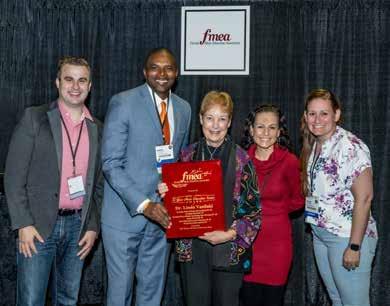
Edwin Anderson........................... 25 years Triangle Elementary School Lake County Schools
Brian Hellhake.............................. 26 years Freedom High School Orange County Public Schools

Sheri Nealey .................................. 26 years

Millennia Gardens Elementary School Orange County Public Schools
David Pletincks ............................ 26 years Powell Middle School Hernando School District
John Bixby ...................................... 28 years
Miami Arts Studio 6-12 @ Zelda Glazer Miami-Dade County Public Schools
Karen Kouri-Perez 30 years
John A. Ferguson Senior High School Miami-Dade County Public Schools
Edgar Rubio ................................ 30.5 years Gulliver Preparatory Academy K-8 Miami

Karen Butler ...................................31 years Itinerant Instrumental Music Orange County Public Schools
Janet Duguay-Kirsten, PhD 32 years South Miami K-8 Center Miami

Robert Keating .............................. 33 years Gulliver Preparatory Academy Upper School Miami

Richard Davenport.................... 33.5 years
Chipley High School Washington County School District
Julie Prock 38 years Winston Park Elementary School Broward County Public Schools

Linda Vasilaki, EdD .................... 50 years
Grand Rapids, Mich. Board of Education, Music Consultant K-6 ............................... 1973-1976
Grand Rapids, Mich. Schools ........ 1976-1977
Grand Rapids, Mich. Board of Education, Talent Education/Suzuki Violin Program ............................... 1977-1982
Shakopee, Minn. School .................1980-1981
Emma E. Booker Elementary School, Sarasota County Schools ................ 1982-1983
The Out-of-Door Academy, Sarasota.......................................... 1984-2023
Julian E. White II, PhD ............... 60 years
Northwestern Junior/Senior High School 1962-1965
William M. Raines High School, Duval County Public Schools 1965-1972
Florida A & M University, Tallahassee 1972-2012
Frank T. Martin Elementary School 2017-2022
continued on page 26
continued from page 25
The Middle and High School Music Enrollment Award is presented to music programs demonstrating high enrollment in music courses. This award recognizes the effectiveness of programs that offer attractive music curricula as well as those that excel in the recruitment and retention of students. Schools hold the award for three years. They may be looked to as models of quality programming, scheduling, and recruitment and retention of students. In order to qualify for this award, at least 30% at the high school level and 45% at the middle school level of the entire student body must be enrolled in a music course.
Middle Schools:
Lawton Chiles Middle Academy 49% Polk County Schools
Principal: Angela Price
Music Educators: Christina Baker, Michael McElwain
Pershing School .................................. 50%
Orange County Public Schools
Principal: Sanjay Brown
Music Educator: Keith Nichols
Avalon Middle School....................... 51%
Orange County Public Schools
Principal: Karen Furno
Music Educators: Garrett Anderson, Evan Powers, Eric Saidat
Barrington Middle School 51% Hillsborough County Public Schools
Principal: Andrea Cummings
Music Educators: Miguel Oquendo-Echevers, David Triplett-Rosa, Yeniffer Velasquez
Lyndon B. Johnson
Middle School ..................................... 52%
Brevard Public Schools
Principal: Marina Saporito-Middleton
Music Educators: Erik Bryan, Carolyn Deck, Charlotte Walters
Hunter’s Creek Middle School ....... 53% Orange County Public Schools
Principal: Joumana Moukaddam
Music Educators: Elizabeth Bichler, Rafael Couret, Meagan Davis, Adrian Sanchez
Williams Middle Magnet School ... 53% Hillsborough County Public Schools
Principal: Shellie Blackwood-Green
Music Educators: AnnMarie Abraham, Michael Garcia
Gotha Middle School 54% Orange County Public Schools
Principal: Monica Emery
Music Educators: Bret Carson, Jimmy Higginbotham, Anthony Lichtenberg

DeLaura Middle School 55% Brevard Public Schools
Principal: Scott Corso
Music Educators: Lisa Benincasa, Jack Carr, Amelia Lohman
Dundee Ridge Middle Academy .... 55% Polk County Public Schools
Principal: Stacy Gideons
Music Educators: Cathy Montero, Craig Sotolongo
Glenridge Middle School ................. 55% Orange County Public Schools
Principal: Daniel Kempinger
Music Educators: James Brannock, Johanna Gonzalez, Jin Jones
Sgt. Smith Middle Academy ........... 55% Hillsborough County Public Schools
Principal: Robert Kleesattel
Music Educators: Joseph Grady, Cynthia Starling
Lockhart Middle School ................... 56% Orange County Public Schools
Principal: Farah Henderson
Music Educators: Christian Adkins, Victoria Lane
Maitland Middle School 56% Orange County Public Schools
Principal: Aski-Melik Brown
Music Educators: Samantha George, Cynthia Johnson, David Olsen
College Park Middle School ............ 57% Orange County Public Schools
Principal: Monica Gordon
Music Educators: Charles Hafner, Julie Simmons
Millennium Middle School ............. 58%
Seminole County Public Schools
Principal: John Antmann
Music Educators: Jacqueline Byl-Bishop, Jason Ernst, Sonia Galarza, Monique Green, William Richardson, William Richey
Progress Village Middle Magnet School of the Arts 59% Hillsborough County Public Schools
Principal: Peter Megara
Music Educators: Kelly Cottet, Kristen Franzen, Bennie Leverett
Thomas Jefferson Middle School... 63%
Brevard Public Schools
Principal: Meara Trine
Music Educators: Ava Bratic, Bobbe Butler, Kathleen Kinion
Matanzas High School ..................... 30%
Flagler Schools
Principal: Kristin Bozeman
Music Educators: Jared Allen, Jens Oliva, Ryan Schulz
Edgewood Senior High School ....... 31%
Brevard Public Schools
Principal: Jacqueline Ingratta
Music Educators: Joseph Franco, Andy Kropp
Dr. Phillips High School .................. 34%
Orange County Public Schools
Principal: Jackie Ramsey
Music Educators: Raine Allen, Jeffrey Brown, Matthew Malhiot, Jane Moore, Nicole Nasrallah, Solangi Santiago, Patrick Waters, Charles Watford
Academy at the Lakes ........................ 68%
Pasco County
Principal: Mark Heller
Music Educators: Gary Compton, Frances Pisacane
Lake Nona Middle School ............... 69%
Orange County Public Schools
Principal: Robert McCloe
Music Educators: Wanda Berry, Courtney Connelly, Hannah Jennings, Ashley Majka, Joanna Sell
Pine Crest School, Palm Beach Campus .......................... 76%
Palm Beach County
Principal: Lawrence Mellone
Music Educators: Sharon Janezic, Allison Mair, Martha Schimelpfenig
Howard Middle School Academy of Arts ................................. 80%
Orange County Public Schools
Principal: W. John McHale
Music Educators: Mary Lubaroff, Keegan Norman, Aaron Penfield, Damon Wille
Orange Grove Middle Magnet School of the Arts 89% Hillsborough County Public Schools
Principal: Michael Miranda
Music Educators: Tyler Carr, Brooke Giles, Darlene Miceli
St. Paul Lutheran School ................ 137% Polk County
Principal: Gregory Sawyer
Music Educators: Daniel Bates, Denise Bates
Satellite High School 35% Brevard Public Schools
Principal: Robert (Bobby) Pruett
Music Educators: Tim Liscum, John Phillips, Christopher Simons
Leon High School 43% Leon County Schools
Principal: Michael Bryan
Music Educators: Lee Commander, Kayleen Justus, Lisa Leaman, Curtis Newson, Tabitha Peck, Edward Prasse, Megan Sahely, Margaret Smith
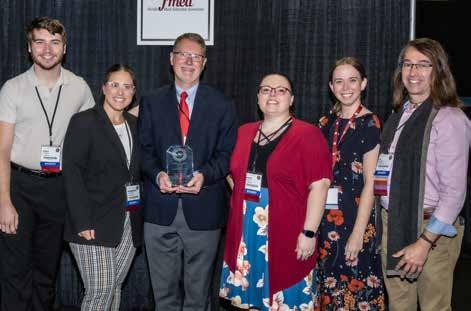
 by Todd Harless
by Todd Harless
I’mthe proud principal of Southport Elementary in Bay County, Florida. As you know, many of our schools were severely damaged during a category 5 hurricane. I went through boxes and carrying cases of some really cool instruments that FMEA and NAfME worked hard on getting donated to our district. I am one very grateful principal that our children will be able to have some of the donated items this school year. The music program at Southport has been an important part of the school for decades, and this donation has helped our music teacher provide opportunities that our children may not have had with our current inventory. I wanted to reach out to you to say thank you very much from Southport Elementary and all the schools here in Bay District receiving your generous donations.
Unfortunately, post-hurricane, one school, Cedar Grove Elementary no longer offers music. So, instrument allocation began with the remaining four schools. The criteria was—what did they need replaced and what did their classrooms have space for? Most of the donated equipment went to these schools:
w Callaway Elementary
w Parker Elementary
w Southport Elementary
w Cherry Street Elementary (Panama City)
The four teachers receiving the bulk of the donations mentioned storage challenges within their classrooms when they saw the quantity of instruments donated. Plus, they did not want to be selfish. With the remaining instruments, I reached out to the rest of the district affected by Hurricane Michael. The music programs below selected an item or two from the remaining inventory to supplement their classroom resources:
w Deerpoint Elementary (Panama City)
w University Academy (Panama City)
w North Bay Haven Charter School (Panama City)
w Waller Elementary (Youngstown)
w Deane Bozeman Elementary (Panama City)
w Lucille Moore Elementary (Panama City)
w Margaret K. Lewis School (special needs) (Panama City)
w Patronis Elementary (Panama City Beach)
w Hiland Park Elementary (Panama City)
w Tyndall Academy (Tyndall Air Force Base)
w Lynn Haven Elementary
w St. Andrews School (Panama City)
Thank you to all of the donors who have shown their dedication to the improvement of music education in Florida by supporting our Mission through financial contributions.
Our donors support specific causes by donating to the FMEA funds of their choice:
FMEA Scholarship Fund
Music Education Advocacy General Fund
June M. Hinckley Scholarship
Professional Development for Members
Mel & Sally Schiff Music Education Relief Fund
The following have graciously donated to FMEA from April 1, 2022, through February 17, 2023.
$10,000 and up
No current donors at this time.
$1,000 – $9,999
All County Music
Artie Almeida
In Honor of June Audrey Grace & Katie Grace Miller
Clifford Madsen
Russell Robinson
$100 – $999
Carlos Abril
In Honor of Dr. Nicholas DeCarbo
Andre Arrouet
Lucinda Balistreri
In Honor of music educators in Sarasota
Christopher Banks
Kasia Bugaj
Dale Choate
Deborah Confredo
In Honor of the fine folks of FMEA who work hard to keep the music education fire lit!
Alice-Ann Darrow
In Memory of Mr. & Mrs. O.B. Darrow
Virginia Densmore
In Honor of Vicki Rhodes
Virginia Dickert
In Memory of Lindsay Keller & Debbie Liles
Scott Evans
Kristin Greene
In Memory of Charles E. Inderwiesen, Jr.
Stanley Hoch
Dennis Holt
Frank Howes
In Memory of Richard Bowles & Harry Grant
Marsha Juday
Steve & Beth Kelly
Sheila King
In Memory of John W. King
Aaron Lefkowitz
Kevin Liotta-DeVivo
On Behalf of HCEMEC
Jason Locker
In Memory of June M. Hinckley & In Honor of those impacted by Hurricane Ian
David Martinez-Cooley
Robert McCormick
Carolyn Minear
John Nista
In Memory of Stanley Dmitrenko
Mary Palmer
In Memory of Amy Catherine Palmer
David Pletincks
In Honor of Alexis & Jonathan Pletincks
Jeanne Reynolds
In Honor of Pinellas County Performing Arts Teachers
Rollins College Department of Music
Mary Catherine Salo
In Memory of Gary Rivenbark & Wes Rainer
Steven Salo
In Honor of John “Buck” Jamison & Dr. William Prince
Kathleen Sanz
In Memory of June M. Hinckley
Fred Schiff
J. Mark Scott
In Honor of Dr. Andre Thomas, Dr. Judy Arthur, & Dr. Judy Bowers
Scott Sheehan
In Honor of those impacted by Hurricane Ian
$25 – $99
Sandra Adorno
Raine Allen
Scott Apelgren
Michael Antmann
Judy Arthur
In Honor of Raymond Kickliter & Nancy Marsters
William Bauer
David Bayardelle
On Behalf of Harry Spyker
Mark Belfast
In Memory of Dr. Mark A. Belfast, Sr.
Antonio Borges
Richard Bradford
In Honor of William S. & Helen H. Bradford
Greg Carswell
Shelby Chipman
In Memory of Herbert Rhodes, Sr.
D. Gregory Springer
Jeannine Stemmer
In Memory of Barbara Kingman & Lauren Alonso
Leiland Theriot
In Memory of Clayton Krehbiel
Richard Uhler
James Weaver
Howard Weinstein
In Memory of Barry Weinstein
Donald West
In Memory of Ron Powell, Vista Audio Productions, Inc.
Blair Williams
David Williams
Kenneth Williams
In Honor of our extraordinary Florida Music Educators
Billy B. Williamson
Marilyn Wirsz
In Memory of Bill & Shirley Head
Anonymous (1)
In Memory of Bonnie Nista
Blair Clawson
In Honor of Ginny Densmore, Alice-Ann Darrow, & Vicki Rhodes
Dayna Cole
In Memory of Linda Mann
Paul Davis
Marc Decker
Dewey Dodds
Sheila Dunn
Judith Evans
Bradley Franks
In Memory of Gary W. Rivenbark
Julie Hebert
Bernie Hendricks
Julia House
In Memory of Dr. Kimberle Moon McKee
Alexander Jimenez
Catherine Kersten
D. Tina Laferriere
Monroe Lewis
Joseph Luechauer
Kevin Lusk
John Marshall
Lloyd McIntyre
In Memory of Bob Hager
Kim Miles
Katie Grace Miller
In Honor of Artie Almeida
Victor Mongillo
Ree Nathan
Galen Peters
Edward Prasse
Melissa Rawls
John Sinclair
Joanna Sobkowska Parsons
John Southall
Mark Stevens
Valerie Terry
David Verdoni
John Watkins
Sondra Wenninger Collins
up to $24
Crystal Berner
Karen Bishop
In Honor of Claudia Davidsen
Laurie Bitters
Jessica Blakley
In Memory of John Rose
Thomas Brown
In Honor of Dr. Samuel A. Floyd
Joseph Callaway
Gwendolyn Carroll
Bethany Confessore
Beth Ann Delmar
Jodie Donahoo
Revae Douglass Ross
Denise Dumala
Christopher Dunn
Monica DuQuette
Debbie Fahmie
Shelby Fullerton
Michael Gabriel
Tina Gill
In Memory of Gary Rivenbark
Bruce Green
Walter Halil
James Hammond
Graeme Winder
On Behalf of all our hardworking music educators
Angela Hartvigsen
William Hazlett
Ciara Hill
Jon Hutchison
Jason Jerald
Kathleen Kerstetter
Mary Keyloun Cruz
In Memory of George Paul Keyloun
Deborah Mar
In Dedication to Mrs. Barbara Kingman
Kyle Matthews
Katie McGuire Menges
Ethan Morency
Chad Norton
In Memory of Cassandra Jean Norton
Jessica Oyster
In Honor of the new band director in my family
John Parris
Mikael Patriarca
Hank Phillips
Amanda Quist
In Memory of Patricia Koning
Diana Rollo
Phil Tempkins In Memory of Susan McCray
FMEA will host its seventh annual Collegiate Advocacy Day at the Capitol. We will meet at the Challenger Learning Center of Tallahassee building in Classroom A on March 28, 2023.

Join us for a special day of information and the tools necessary to meet with your state legislators. This is an exciting opportunity to advocate for music education.
March 28, 2023, 8:00am-2:00pm
Challenger Learning Centerof Tallahassee (Classroom A)
200 S. Duval Street, Tallahassee, FL 32301
Please contact Kathleen D. Sanz, PhD, with any questions: kdsanz@fmea.org
Anonymous (6)
Melissa Salek
Ian Schwindt
Joani Slawson
Karen Smith
Kelly Southall
Eddie Steadman
Andrea Szarowicz
Mark Thielen
Gary Ulrich
Noiree Weaver
Bradley Wharton
Julian White
In Memory of Kenneth Tolbert
Lindsey Williams
Jennifer Zahn
Anonymous (14)


March 31 – April 1, 2023

Matanzas High School
Palm Coast, Florida
The purpose of the Steel Band Festival is to provide steel band students and directors a positive performance outlet and motivating goal, to share ensemble literature among teachers, and to create an event that allows teachers to become more knowledgeable in their craft through clinician contact time, all to ultimately advance the experience of steel band students throughout the state of Florida.
Entry Fee: $90 per steel band, regardless of size. Each solo or small ensemble entry is $25. Checks are to be made payable to FMEA and mailed to 402 Office Plaza, Tallahassee, FL 32301-2757. The entry form, generated by the online entry application below, must be printed and signed by the principal and director and mailed along with the check.
Questions: Jared Allen, Festival Coordinator allenja@flaglerschools.com for the online entry application.
Overview: The focus of this event will be on the performance of steelpan solos and ensembles. Every performance will receive a supportive clinic from this year’s clinician.

Teacher Qualifications: Each director should be a current member of the Florida Music Education Association (FMEA) by March 1, 2023.
Student Qualifications: Steel band members must be a part of an elementary or secondary school curriculum either during school or extracurricular.
Performance Time: Each entry will have 20 minutes of performance and a 10-minute clinic. If a band chooses to do sight-reading, they will get an additional 15 minutes in their timeslot to complete the sight-reading process.
Performance Subdivision: Each steel band entry can divide the performance time into smaller ensembles if desired. For example, an entry of 20 can play one song utilizing all 20 students, followed by one song for 10 students, followed by the other 10. For smaller musical selections, directors are encouraged to submit them as separate chamber ensemble entries.
Music Selection Criteria: Due to the variance in curriculum and class structure, directors should select music that is appropriate and challenging to the students in their classroom. If the music being performed is published, the director must bring the original score for the clinician. This is to assist the clinician in providing useful comments and also to discourage unlawful photocopying. Directors are, of course, able to perform their own unpublished arrangements. Directors are encouraged to program at least one selection that includes a traditional soca or calypso style including typical engine room instruments.
Sight-Reading: Sight-reading is an optional component in the festival. Sight-reading music will be produced by the Sight Reading Factory, and every band will be given unique music. When completing your online application, you will choose from the following options:
U No Sight-Reading
U Easy Unison
U Easy Two-Part (treble & bass)
U Easy Four-Part
U Challenging Unison
U Challenging Two-Part (treble & bass)
U Challenging Four-Part

“Easy” will consist of quarter note and longer note duration with no leaps larger than a 3rd in the key of C and 4/4 time (Level 1 on SRF).
“Challenging” will include eighth and sixteenth rhythms with no leaps larger than a 4th in the key of C, F, or G in 4/4, 3/4, or 2/4. (Level 3 on SRF). Bands requesting to sight-read will be given an additional 15 minutes in their time slot for sight-reading and feedback from the clinician.
Equipment: Music stands will be provided for each performing group. Performing groups must provide all instruments and instrument stands used in performance, including drum set and engine room. There will be access to electrical outlets.


Two common reasons for teacher evaluation are accountability and personal growth (Stronge, 1995). One of the primary purposes of using a teacher evaluation system is to provide feedback to teachers for improvement on future lessons through reflection. Teacher evaluation systems are used to help analyze data on the quality of teaching within a school, district, or state for use in highstakes decision-making, such as salary and continued employment. Both purposes require teacher evaluation systems to produce reliable and valid results. High-stakes decision-making based on teacher evaluations may cause teachers to view evaluations negatively and shift the focus away from professional growth.
Florida allows districts to select evaluation systems that align with the standards of Florida Educator Accomplished Practices (FEAPs). The required alignment of the evaluation systems presumably ensures consistency in teacher evaluation across districts. The Florida Department of Education (FLDOE) defines the state’s accomplished practices as “Florida’s core standards for effective educators [that] provide valuable guidance ... on what educators are expected to know and be able to do” (Florida Department of Education, 2022, para. 1). Furthermore, the FLDOE states that the accomplished practices are the foundation for teacher preparation, educator certification, and district instructional

 by Amber R. Alderman
by Amber R. Alderman
personnel appraisal for Florida. The standards were initially established in 1998 through the State Board of Education’s ruling 6A-5.065 and were updated in late 2010.
The Florida Educator Accomplished Practices (2011) consist of three foundational principles that define qualities of an effective educator: creating a culture of high expectations in academics, demonstrating a deep and comprehensive knowledge of the subject matter, and exemplifying the standards of the profession. These principles lead to six educator accomplished practices: (1) instructional design and lesson planning, (2) assessment, (3) learning environment, (4) continuous professional improvement, (5) instructional delivery and facilitation, and (6) professional responsibility and ethical conduct.
Figure 1 illustrates the Florida Educator Accomplished Practices. Because the state allows for many evaluation systems, I have chosen three systems to evaluate in this article. The three evaluation systems are the Framework for Teaching (FFT), used by Hillsborough County School District; the Stronge Goals and Roles Classroom Assessment and Evaluation Model, used by Miami-Dade County School District; and the Marzano Classroom Teacher Evaluation Model (FTME), used by Broward County School District. The three districts were selected because they have a large number of schools to allow for a comparison of these three systems.

The three selected evaluation systems are representative of the evaluation systems used in the state of Florida. The comparisons use each county’s adopted version of the systems found on the applicable district’s or the state’s website. The FLDOE’s official teacher evaluation system is based on research and the analysis of research on teacher evaluation by Marzano.
Rubrics are an essential aspect of teacher evaluation systems, allowing educators to know the expectations to meet during observations prior being observed. Table 1 compares the rubric evaluation ratings for each district. Both Danielson’s and Stronge’s rubric use a four-category rating system, whereas Marzano’s rubric is divided into five ratings, indicating a more nuanced distinction between middle-range teachers.
The wording of the lowest ratings differs among the rubrics with “Requires Action” (Hillsborough County Public
Schools, 2017), “Unsatisfactory” (Office of Professional Development and Evaluation, 2018), and “Needed” (School District of Broward County, 2019). Marzano’s “Needed” implies the absence of what is being observed, Stronge’s “Unsatisfactory” signifies what is being observed is there but not well executed, and Danielson’s “Requires Action” implies that whatever is being observed or not observed needs to be improved for future teaching. The second to lowest rating provides more consistent language between rubrics with “Progressing” (Danielson), “Developing/ Needs Improvement” (Stronge), and “Emergent” (Marzano), all implying learning but not mastery of skills. Interestingly, Stronge includes “Needs Improvement,” which corresponds to Danielson’s lowest rating of “Requires Action,” suggesting that rubrics do not align in evaluation ratings. Marzano’s rubric is the only one to provide a neutral score (neither positive nor negative). The secondhighest rating uses the same language of “Accomplished” in the Danielson and Marzano rubrics. Stronge’s rubric uses
the word “Effective” with a more neutral connotation and corresponds more to Marzano’s “Proficient” rating than to accomplished. Marzano and Danielson also use the same word “Exemplary” to define the highest-rating score; Stronge uses “Highly Effective.” The word exemplary implies above average or excelling practices, whereas highly effective does not mean extraordinary practices. The wording of rubrics implies different meanings in several ratings, particularly in the lowest category between the rubrics, indicating essential differences in the evaluation systems. These differences imply that teacher ratings are inconsistent between evaluation systems.
The detail provided in the rubrics and the number of criteria vary between each evaluation system. Danielson provides 22 criteria with specific information describing what should be observed by the evaluator for each criterion in each rating (Requires Action, Progressing, Accomplished, and Exemplary). The focus of the rubrics shifts between teacher, student, or both depending on the
criteria. Marzano provides 23 criteria, focusing on the number of students demonstrating the behavior (none, less than a majority, majority, 90% of students) for criteria associated with students. Some of Marzano’s criteria focus only on teacher behaviors, such as the criteria for adhering to school district policies and procedures. Stronge provides the fewest number of criteria with only eight. Many of the criteria are worded as “the teacher consistently meets…,” “the teacher identifies and addresses…,” “the teacher attempts…,” and “the teacher consistently demonstrates a lack of…” indicating that the Stronge teacher evaluation focuses on teacher behaviors (Office of Professional Development and Evaluation, 2018, p. 43).
The three systems vary greatly in descriptive detail in the criteria. The details in Danielson’s criteria clarify what the observer is looking to evaluate but are also so precise that an observer may have to decide how to rate a teacher who may be demonstrating behaviors that appear in more than one rating. The criteria used by Marzano and Stronge are
less specific and more consistent across criteria in the language used. The lack of explicit language in these rubrics creates a blurry picture of what the observer is expected to evaluate. As mentioned previously, the Marzano criteria are unique in that the number of students displaying the desired effect is considered for the rating. Evaluating based on the number of students is a very different mentality; the students must respond behaviorally to the teaching for a high rating in many instances. The Stronge rubric is more vague in language and lacks specifics for individual criteria, leaving much of the evaluation up to the observer’s interpretation. The Stronge evaluation system provides teachers with less feedback to improve and less data for overall teacher ratings calculations.
There are many important differences between the rubrics in the three evaluation systems, including the number of criteria, the number of ratings, the details of individual criteria, and the language used. The differences in the rubrics suggest that despite all three of the systems reportedly aligning with Florida Educator
Accomplished Practices (FEAPs), the way the FEAPs are measured (ratings) vary for each evaluation system.

The accomplished practices that each evaluation system focuses on can be determined through comparing the number of times criteria can be categorized under each accomplished practice. Table 2 provides the number of criteria for each accomplished practice.
Table 2 shows the differences in how each evaluation system focuses on accomplished practices. The evaluation system used in Broward County focuses on instructional delivery and facilitation. The criteria for Stronge and Danielson are more evenly distributed across the accomplished practices, suggesting that the evaluation system does not primarily focus on one area. Stronge’s rubric criteria are the most evenly distributed of the three. Danielson’s criteria slightly favor the learning environment.
The rubric and criteria used in teacher evaluation systems provide important information on what the observer is looking for, what accomplish practice(s)

continued from page 37
receiving high ratings because it takes practice for the teacher and the students to demonstrate behaviors associated with each practice successfully. Focus on specific areas to improve during an observation, and integrate behaviors related to the practices in time to practice before being observed. Understanding the district’s evaluation system and planning for teacher evaluations provide proactive ways that music teachers can prepare for evaluations, have a meaningful discussion with observers, and make evaluations less threatening, allowing for the focus to shift to professional growth.
the criteria of the rubric primarily focus on, and how teachers should be rated. Understanding the teacher evaluation system assessing the teacher allows the music teacher to be proactive in preparing for observations.

Understanding the evaluation system allows music teachers to prepare for upcoming evaluations and to target specific areas that may need improvement. Part of the process of understanding the evaluation system is being familiar with the wording and focus of the rubric. Is the rubric looking for students’ behaviors or the teacher’s behaviors? Are most of the rubric’s criteria assessing instructional delivery and facilitation, or are the criteria evenly distributed across accomplished practices? Music teachers should think about what high ratings for each category look and sound like in the music classroom and be able to explain to an evaluator how the lesson aligns with the criteria and the evaluation system being used. Evaluators unfamiliar with music content and pedagogy may have difficulty
understanding how what they are observing aligns with the criteria. Having a pre- or post-observation conference with the observer to discuss lessons can help clarify what happened during the observation and help evaluators not familiar with music understand how the lesson fits with the criteria. If pre- and post-observation conferences are not standard, ask the observer if a conference can be scheduled for observations.
The wording and details of the criteria provide valuable information for preparing for observations and making a professional development plan. Knowing what evaluation system the district uses and carefully looking at the language used in the rubric will allow the teacher to know if the rubric’s criteria are teacher- or student-centered (or both). It will also inform the teacher about the main focus areas of accomplished practices for the evaluation. Using the rubric to observe other music teachers will allow for insight into what the observer sees and will allow the teacher to be more familiar with the criteria.
Using the accomplished practices should become a habit for teachers
Amber R. Alderman has teaching experience in public and private schools in strings, vocal, and general music education. She has earned degrees in music education from Florida Southern College and Florida State University and is working to complete a PhD in music from the University of South Florida.
Florida Department of Education. (2022). https://www.fldoe.org/teaching/ professional-dev/the-fl-educatoraccomplished-practices.stml
6A-5.065 The educator accomplished practices (2011). Florida Department of Education. The Educator Accomplished Practices, Pub. L. No. 6A-5.065 (2011). https://www.flrules.org/ gateway/ruleNo.asp?id=6A-5.065
Hillsborough County Public Schools. (2017). Teacher evaluation handbook. Hillsborough County Public Schools.
Office of Professional Development and Evaluation. (2018). Instructional performance evaluation and growth system procedural handbook. Miami-Dade County Public Schools.
School District of Broward County. (2019). Instructional personnel evaluation system
Stronge, J. H. (1995). Balancing individual and institutional goals in educational personnel evaluation: A conceptual framework. Studies in Educational Evaluation, 21(2), 131–151. https://doi.org/10.1016/0191-491X(95)00010-R

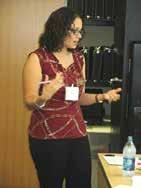

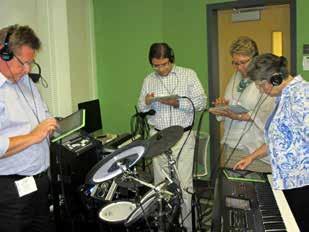
The FMEA Summer Institute brings together music educators across all components and grade levels to envision future trends and discuss how to embrace the changes in music education. Join a small group of current and future leaders in music education in an inspiring multi-day training program.
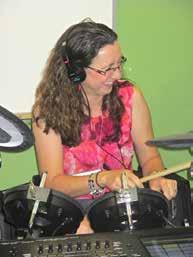
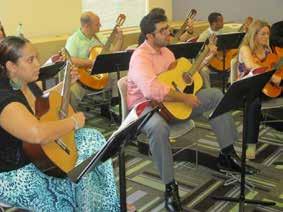

All full active FMEA members are encouraged to apply! Cost to apply is $75. Applications must include 2 letters of references.
Apply by April 10, 2022
June 12-14, 2023
University of South Florida
S u m m e r I n s t i t u t e 20 22
June 5-8, 2022
The field of education is evolving to promote the inclusion of all students and their diverse backgrounds. An innovative approach to education shows awareness of trauma, as it affects all people through direct or indirect experiences. Trauma is defined as “the response to an unexpected or overwhelming violent event or events that are not fully grasped as they occur, but return later in repeated flashbacks, nightmares, and other repetitive phenomena” (Bradley, 2020, p. 6). Often, trauma is difficult to understand because of its enigmatic nature. As Bradley (2020) stated in the definition of trauma, the original event is often not fully grasped by the trauma victim. In educational settings, trauma symptoms may be
misidentified as learning disabilities (Bradley, 2020; Brunzell et al., 2015). Further, students who have experienced trauma are more likely to experience low academic achievement, suspension, or truancy (Brunzell et al., 2015). The ambiguous nature of trauma has led educators to seek ways to implement trauma-informed pedagogy (TIP) into the classroom. TIP is an educational approach that encourages teachers to modify pedagogy to support the well-being of all students. A trauma-informed approach assumes good intentions and allows students to reach their full potential. Music educators play an integral role in the implementation of TIP (McEvoy & Salvador, 2020).


The Role of Educational Institutions
Educational institutions play an important role in students’ identity development. Policies, curriculum, and pedagogy associated with educational institutions can either benefit or damage identity development, which should encourage administrators and educators to enact educational practices that will benefit all students (Bradley, 2020). According to McEvoy and Salvador (2020), trauma-informed pedagogy begins at the macro level. Institutions should provide training and resources to help educators implement these practices into their classrooms. Educational policies and disciplinary systems should also be modified to reflect trauma-informed practices in education.
Enacting TIP in the classroom requires teachers to honor culturally diverse experiences through content and context. Content refers to materials used to meet teaching standards (such as programming repertoire), and context refers to a nurturing environment where students feel comfortable learning new content (McEvoy & Salvador, 2020). Content and context are not mutually exclusive and should complement each other. The foundation of TIP begins with the creation of a safe classroom environment.
Implementation of TIP and the closely related concept of culturally responsive teaching should be a regular tool used in the classroom (McEvoy & Salvador, 2020). Trauma has directly or indirectly affected all students in a classroom. Therefore, consistent implementation of TIP creates a student-centered classroom rather than a content-centered classroom. Educators should be cognizant of content delivery, ensuring the delivery creates a nurturing environment where trauma and culturally diverse backgrounds are considered.
Culturally responsive teaching differs from multiculturalism in the classroom. Multiculturalism is primarily resource-centered, whereas culturally responsive teaching is student-centered (McEvoy & Salvador, 2020). Teachers often confuse culturally responsive teaching with multiculturalism. Multiculturalism should be used as a tool to enhance culturally responsive teaching, creating meaningful experiences for students with diverse backgrounds. Finding resources to enhance musical experiences in the classroom should be the initial step taken toward culturally responsive teaching and should not be considered the sole reason an educator believes they are changing their pedagogical approach to honor traumatic experiences and culturally responsive teaching.
continued on page 42
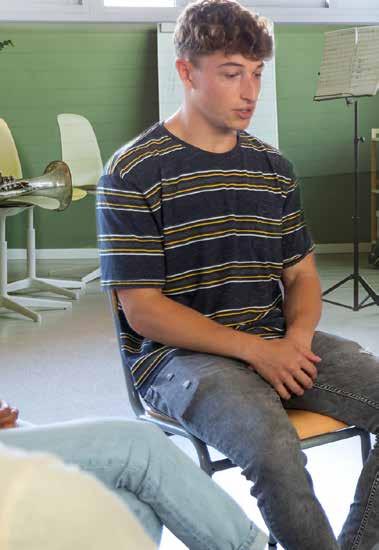
Teachers should aim to create a nurturing environment that encourages students to reach their full potential (McEvoy & Salvador, 2020). They should also provide students with opportunities to show their strengths in the classroom. An example of encouraging students to reach full potential includes student-centered assessments. Allowing students to create assessments in a guided group context allows students to synthesize material they believe is important while creating opportunity for them to ask questions for clarification. Instead of requiring a written reflection, perhaps students could record an audio or visual presentation in lieu of a writing component. Ultimately, TIP should shift focus from teacher obligations to student well-being (Yi, 2021). This creates opportunity for self-expression while catering to different learning needs in the classroom. A nurturing environment begins when students are given an opportunity to engage in dialogue on what pedagogical approaches work best for them.
TIP encourages educators to look inward and seek ways to understand their own trauma responses. Inward reflection will help provide a proactive learning environment where students are encouraged to engage in the reflective process (McEvoy & Salvador, 2020). Educators must come to terms with their own trauma before attempting to help others in their healing processes (Walzer, 2021). Reflecting inwardly plays an important role in the classroom because many students lack the resources to participate in therapy and subsequent treatment plans. Therefore, the healing process for many students may begin in the classroom. TIP can only work when educators know how to regulate their own trauma that in turn will encourage students to focus on their own physical and emotional regulation (Brunzell et al., 2015). Some examples of ways that teachers can encourage students to look inward and self-regulate include implementing guided journal prompts into the classroom, providing “brain breaks” throughout class time, and encouraging physical movement in rehearsal. Small implementations of self-regulation and reflection help to create a student-centered environment.
The nature of trauma leads humans to maintain a survival mode mentality. Relinquishing the survival mode mentality requires the acknowledgment that trauma exists. Fostering a nurturing environment and establishing a rapport between educators, their students, colleagues, and fellow musicians helps promote open dialogue where the acknowledgement of trauma can be discussed (Walzer, 2021). Ultimately, discussing trauma does not have to be the sole focus of TIP. The essence of music education requires humans to connect with one another. A part of this connection must allow opportunity for discussion of the human experience. The human experience is incomplete without the discussion of grief and trauma. Therefore, human connection is an integral part of TIP (Walzer, 2021). In an article entitled “Confronting Racial Trauma in the Music Classroom,” Yi (2021) stated, “Build the resilience by building the relationships. Less prep, more presence” (p. 58). TIP begins with the educator creating a safe and student-centered classroom environment where relationships are cultivated and healthy levels of rapport are established, which will subsequently lead to TIP.
Teachers should use behavior modification to uplift students rather than punish them. Teachers sometimes overly focus on punishing students for unwanted behaviors, whereas a positive approach is more in line with TIP. Understanding that unwanted behavior stems from a personal traumatic event helps educators create nurturing environments for students recovering from trauma (Bradley, 2020). TIP roots itself in positive psychology, defined as “the empirical paradigm that studies wellbeing, human strengths, and optimal functioning in individuals, groups, and organizations” (Brunzell et al., 2015, p. 6). Modifying behavior in context of TIP encourages educators to assume good intention in all students, which in turn will allow students to reach their maximum potential. Therefore, educators should examine their approaches to classroom behavior modification and seek ways to ensure students are not being punished. Rather than punishing, positive behavior should be reinforced and rewarded as much as possible. Shifting the focus to a positive mindset not only creates a safe classroom environment, but also establishes rapport
between educator and student that in turn leads to an informed approach to pedagogy.
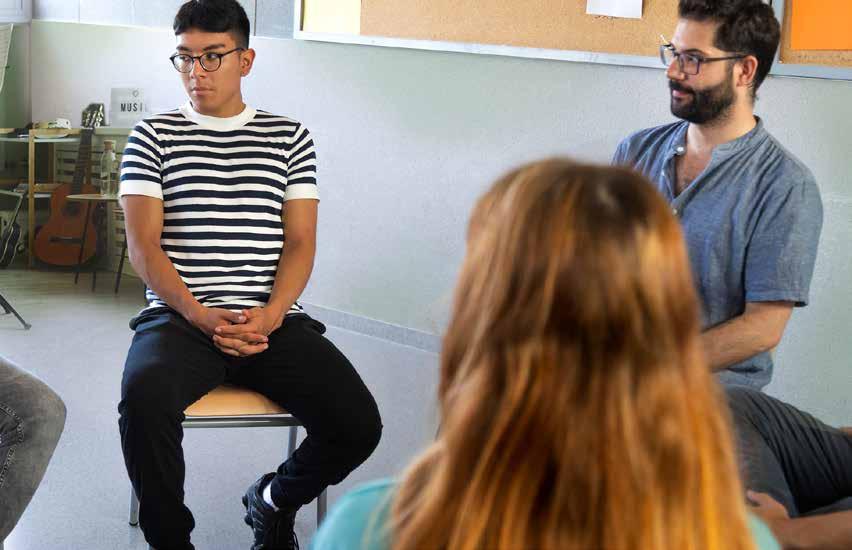
A practice within TIP is the resilient mindset, or the acknowledgement that students consistently make resilient choices that may seem trivial to an adult. An educator understands the obligation of attending school or work every day. However, a student attending school every day despite experiencing frustration at school is an act of resilience. Expressing acknowledgement and gratitude to students’ acts of resilience is a subtle technique found in TIP. This mindset encourages students to promote positivity and provide perspective to the students affected by trauma. Trauma may lead to psychological dismissal of a place or group of people as a coping mechanism (Brunzell et al., 2015). For example, a student who has been bullied at school or demeaned by an educator’s lack of understanding may lead them to dismiss all educational institutions and adults. Assuming good intention and acknowledging acts of resilience may be the initial step needed to help students escape from traumatic cycles.
continued on page 44
The essence of music education requires humans to connect with one another. A part of this connection must allow opportunity for discussion of the human experience.
continued from page 43
Music plays an important role in recounting human experiences, and musicians have the power to illustrate traumatic events through performance. For example, a vocal ensemble can prepare and perform an African American spiritual, recounting the events that led to the composition. Educators can research the history of the spiritual and teach their students the composer’s intentions. However, representations of these traumatic events usually result in trivializing a composition to make performances more accessible to audiences. Compositions burgeoned from traumatic events have often become a “show stopping” enhancement to a concert program. Therefore, music educators should provide opportunity for dialogue surrounding performance. Educators can engage in difficult conversations with their students and their audiences to appropriately contextualize a piece of music. Further, educators must know their concert program beyond the notes and rhythms. Discussions of each piece and its history and related trauma help contextualize the music for the performers, providing an opportunity to appropriately convey emotions akin to the music. Educators and conductors should also provide program notes or pre-concert lectures to appropriately contextualize music without minimizing traumatic experiences
(Bradley, 2020).
Discussing traumatic histories in the classroom without further traumatizing students is a pedagogical conundrum. However, avoiding discussions may not only leave students susceptible to a revisionist history but also a lack of understanding history that emerged from trauma (Bradley, 2020). For example, without understanding slavery in United States history, an educator will not fully grasp the spirituals that emerged from those traumatic experiences. Educators must research each piece they program for their ensembles and prepare to engage in meaningful dialogue—dissecting the historical background of these compositions, including the traumatic events that inspired these pieces of music. Discussion of traumatic events should subsequently
follow the implementation of a nurturing classroom environment where students feel compelled to participate in meaningful dialogue and difficult conversations.
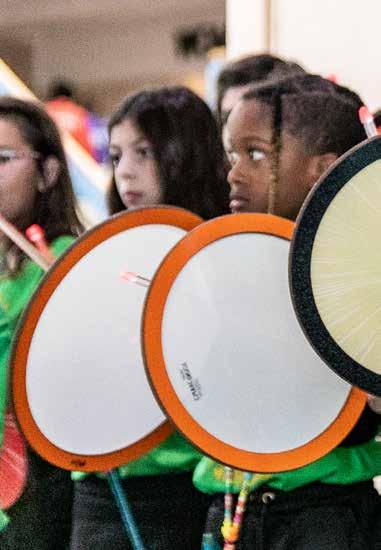
Trauma-informed pedagogy not only requires the trauma victim to come to terms with their traumatizing event but also requires an educator or administrator to listen to and engage in meaningful dialogue (Bradley, 2020). Breaking the cycle of stasis requires educators to discuss difficult topics regarding trauma beyond the superficial. Surface-level conversations do not promote the growth mindset accompanying trauma-informed pedagogy (Bradley, 2020; McEvoy & Salvador, 2020). Meaningful dialogue begins when the process (daily rehearsal experiences) outweighs the product (performance). Often, the product becomes the sole purpose of music education. Music educators often place a significant amount of focus on ensuring notes, rhythms, and articulations are at a high level for performance. Although these are important factors that contribute to successful music education, educators must remember to
The promotion of a safe environment, human connection, and positivity are markers of trauma-informed pedagogy.
connect the process of making music to the human experience. Every student in a classroom or in an ensemble has directly or indirectly experienced trauma and are learning to navigate these experiences while considering their identity development. Implementing TIP as a music educator is a challenging task, but the cultivation of nurturing relationships and prioritizing process over product creates a meaningful experience for students. Prioritizing process over product encourages music educators to engage in TIP that caters to students and their diverse backgrounds.
Music educators should constantly seek ways to cater to students who have experienced trauma. Discussing trauma should be not the sole focus of TIP. Rather, the promotion of a safe environment, human connection, and positivity are markers of trauma-informed pedagogy. Further, emphasizing process over product and appropriately contextualizing music enhances the implementation of TIP. These practical implications for educators help with the implementation of TIP in the classroom.
Ramon Cardenas is pursuing a PhD in music education: choral conducting at Florida State University. Prior to his studies, Mr. Cardenas taught high school choir for six years. He holds degrees in music education and choral conducting. He serves as the director of music at First Presbyterian Church of Quincy, Florida.
Bradley, D. (2020). We are all haunted: Cultural understanding and the paradox of trauma. Philosophy of Music Education Review, 28(2), 4–23. https://doi.org/10.2979/ philmusiceducrevi.28.1.02
Brunzell, T., Waters, L., & Stokes, H. (2015). Teaching with strengths in trauma-affected students: A new approach to healing and growing in the classroom. American Journal of Orthopsychiatry, 85(1), 3–9. https://doi.org/10.1037/ort0000048
McEvoy, C. A. & Salvador, K. (2020). Aligning culturally responsive and trauma-informed pedagogies in elementary general music. General Music Today, 34(1), 21–28. https://doi. org/10.1177/1048371320909806


Walzer, D. (2021). Fostering trauma-informed and eudaimonic pedagogy in music education. Frontiers in Education, 6, 1–8. https://doi.org/10.3389/feduc.2021.647008
Yi, T. S. (2021). Confronting racial trauma in the music classroom. Music Educators Journal, 108(1), 57–59. https://doi. org/10.1177/00274321211035688






Please take time to thank and support our 2022-2023 Corporate Partners.


Eastman Music Company


Head’s House of Music
Meloquest, Inc.
Music & Arts

Music Man, Inc.
National Concerts
Orlando Philharmonic Orchestra
Orlando Sings
West Music Company

 William I. Bauer, PhD FMEA Research Committee Chairperson, University of Florida
William I. Bauer, PhD FMEA Research Committee Chairperson, University of Florida

Onerationale for why music education should be part of school curricula is that it allows individuals to develop the knowledge, skills, and dispositions that enable them to engage in active music-making throughout their life, thereby enhancing their quality of life. Historically, this has been part of professional discourse surrounding major events such as the Yale Seminar in 1963, Tanglewood Symposium in 1967, and Housewright Symposium on the Future of Music Education in 1999, as well as the object of study by numerous music education scholars. Matthew A. Boswell (2022) decided to explore this topic by conducting a review of the related research literature. A review of literature is the process of summarizing, synthesizing, and/or critiquing the literature (i.e., articles, books, dissertations, etc.) on a topic. The purpose of Boswell’s review “was to examine previous research on adult participation in large ensemble (i.e., band, choir, or orchestra) community music settings with a particular focus on the idea of transition, or preparation of students for adult music making opportunities” (p. 57). A limitation of this review of literature is that Boswell only studied literature related to large community ensembles, not including research on other types of amateur adult music-making such as playing chamber music, performing in vernacular music ensembles, solo performances on instruments such as piano and guitar, and so on.
Members Demographics
Most community large ensemble members are more than 50 years old. There is also a gender differential in choirs (more women than men) and bands (more men than women). Few minorities participate in these community groups. In the studies examined, 70% or more of members had attended college and/or were college graduates. They were also better off financially than the average person.
A large percentage of band and choir members had participated in their corresponding high school ensembles, as did most
This on-going column seeks to stimulate awareness of research issues for FMEA teachers and researchers.
community orchestra members, albeit at a lower rate than those in band and choir. Community band and choir musicians tended to have participated less frequently in college ensembles than they had in high school groups. Members reported sight-reading (band) and sight-singing (choir) as important skills developed in high school ensembles. Instrumentalists regularly took private lessons, as did vocalists but at a lower rate than the instrumentalists. Band, choir, and orchestra members had often performed as soloists or in small ensembles in competitive and non-competitive settings. They also were participants in honors ensembles during high school. Their parents/guardians and teachers were major influences on their participation in school large ensembles.
Participants in the studies reviewed by Boswell (2022) indicated musical, personal, and social reasons for continuing to perform as an adult in community ensembles. They stated they loved music and the aesthetic experience of performing. On a personal level, they indicated their ensemble participation was fun and gave them a sense of satisfaction. The social aspects of making music in a large ensemble were very important, even more significant than musical reasons in some studies. On the other hand, a lack of time was frequently cited as a reason why people did not participate in large community ensembles. For some, financial issues, concerns over their diminished musical skills, and a fear of auditions were additional factors that inhibited participation. Encouragement by their secondary ensemble teacher to participate in music after high school was mentioned as critical in making the transition to adult membership in a community ensemble.
Boswell (2022) provided several implications for music teaching and learning based on his analysis of the literature reviewed. Among them were:
w Providing all students with experiences focused on developing interest in music and music skills prepares students best for adult music-making.
w Music educators should endeavor to increase student performance opportunities of diverse music styles in groups of all sizes, from chamber groups to large ensembles.
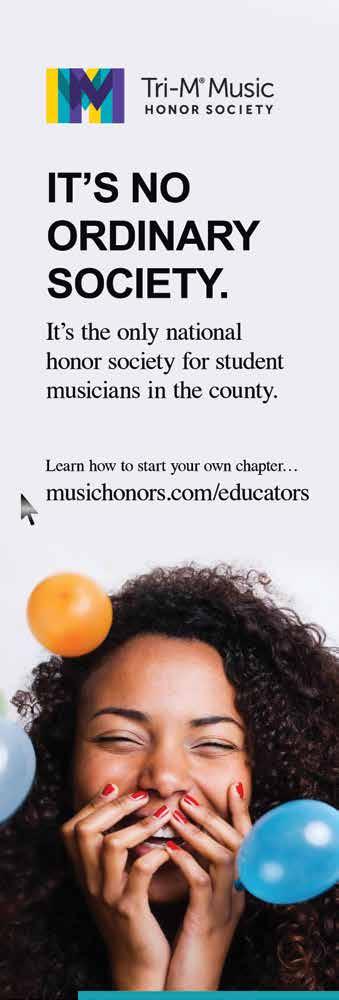
w Encouraging independent music-making within the school ensemble setting can provide students with the tools and confidence necessary to transition into the community music environment.

w Community musicians and music leaders could collaborate with school music teachers to provide students with visible role models of lifelong music-making. (p. 56) Additional details of this and other studies with practical implications for music classrooms and rehearsals can be found by accessing the website of the journal UPDATE: Applications of Research in Music Education, found at https://bit. ly/nafme-update. The mission of UPDATE is to bring “research in music teaching and learning close to everyday practice to help teachers apply research in their music classrooms and rehearsal halls” (National Association for Music Education, 2022b, para. 1). All FMEA members can read UPDATE as part of their FMEA/NAfME membership.
Reference
Boswell, M. A. (2022). Music for a lifetime: How are we doing? A review of literature on adult participation in large community music ensembles. Update: Applications of Research in Music Education, 40(2), 56–65. https://doi. org/10.1177/87551233211040735


During my time as president of the Florida Music Supervision Association, I’ve had the honor and duty to write for the Florida Music Director (FMD). Inspiration for these missives has come from a wide array of sources … my family, my colleagues, Dr. Neil DeGrasse Tyson by way of Stephen Colbert, and now don Miguel Ruiz.
So much of the act of teaching hinges on how we interact with the people in our world. In an edu-
cational setting, this tends to center on our students. As I reread don Miguel’s The Four Agreements, I reflected on how these function for me as a teacher and as a student. If you’re not familiar with this work, the subtitle is “A Practical Guide to Personal Freedom.” It can function as a guide or simply inspire thoughtful reflection on how we choose to experience this journey we’re on. For my final two submissions for FMD, I would


Spring is here, and I hope preparations for your upcoming concerts are going well. The Florida College Music Educators Association has exciting news to share!
First, I am delighted to report that the 2023 recipient of the FCMEA Creative Explorations Grant is Dr. Brandon McDannald from the University of Tampa. His project, “Making the Music Education Major Transition from Florida Community Colleges to University: AA to BME,” is one of strategic interest to the association, and we look forward to hearing more about it in the months to come. Thanks go to the members of the FCMEA Grant Committee for their work reading through a record high number of grant applications. Committee members were Dr. Erin Bodnar from the University of North Florida, Dr. Mitchell Hutchings from Florida Atlantic University, and Professor Troy Jones from Florida Gulf Coast University.
Second, FCMEA held officer elections during the conference in January, and the membership elected Dr. Kyle Prescott from Florida Atlantic University to serve as president-elect. The leadership of FCMEA will transition this summer and be led by our incoming president, Dr. Sandra Adorno from Florida International University. I am excited for the future of our association and look forward to seeing it grow under a new leadership team.
I hope all your teaching, creative, and scholarly endeavors go well this spring!
like to ask for your indulgence as I take a few moments to address these Four Agreements within the context of teaching. The Four Agreements are:
1. Be Impeccable With Your Word.
2. Don’t Take Anything Personally.
3. Don’t Make Assumptions.
4. Always Do Your Best.
The author admonishes that we speak with integrity and say what we mean and mean what we say. From a student perspective, this could be presented in what our students can expect from us when they enter our sphere of influence. If we are impeccable—consistent, precise, and concise—our interactions with our students might also be seen as reliable. I know I am more comfortable in situations where I feel confident in my ability to predict how I will be treated, whether in a teaching/learning setting or in a professional-level meeting. If I don’t know the person I’m interacting with, I tend to give them the benefit of the doubt that they are good people unless or until they prove otherwise. Now imagine when you’re in a situation where there’s a real or perceived “power” dynamic (e.g., student-teacher, teacher-principal, teacher-superintendent, etc.). If you believe you will be treated with respect and kindness, you are more likely to enter the interaction with a willingness to listen and understand, which I think would be a good mindset for our students to possess in our classrooms.

I know I have been guilty of taking the behaviors of others as a personal indictment. I’ve also made the mistake of projecting motive to what a student was doing rather than simply observing their behavior and providing appropriate and dispassionate redirection. An important mentor of mine, Dr. Madsen stated you get to decide whose accolades and/or criticisms you will accept. Conversely, you also get to decide whose feedback is of no real consequence. Not all feedback is created equal.
Our students and colleagues are working hard every day in myriad situations, and in many cases, music class is but one relatively small part of their daily existence. While of course I would love to have all students “eat and sleep music,” that’s just not a reasonable expectation. What I know I can expect is they will all act in a way that is aligned with their levels of mental, emotional, and physical development and I, in turn, need to respond in a way that aligns with my own level of maturity. Not always an easy task for sure, but if we choose to believe we are all doing the best we can with what we’ve got each day, we are more likely to temper our reactions with grace and patience. As we model kind and patient behaviors with all those around us, we can know we are doing our part to make the world kinder and gentler, or when we feel the need to include “bless her/ his/their heart …” maybe choose to love them through it—whatever “it” may be. Coming soon …
We’ll continue with Ruiz’s guide with “Don’t Make Assumptions” and “Always Do Your Best.”
FBA family! Can you believe it is March already? 2023 is frantically moving along and before we start to look ahead, I think it’s worthwhile to take a quick look back. The 2023 FMEA Professional Development Conference and All-State Concerts was an absolutely awesome experience filled with many growth opportunities. Our seven all-state band ensembles performed extremely well, and the concerts and rehearsals were a true demonstration of how wonderful our students are as well as the great teaching they receive from all of you. A special thanks to any and all of the directors who volunteered your time, talents, and efforts to make our all-state ensembles a success and a valuable learning experience for all of the students involved. Also, let’s hear it for all of our wonderful FBA session presenters and session coordinators. And finally a huge shout-out to our more than 1,200 FBA members who were in attendance at the conference, nearly 200 of those collegiate members, which is huge for our future.
In a previous update email, I labeled the months of February and March as “OMG, It’s NEXT WEEK!” Month. With all the madness of our spring MPAs, can you believe we are now just a few days away from spring break?! We must take the time to evaluate our personal journey through these busy seasons. There are plenty of mixed opinions and feelings about our music performance assessment process, and that is perfectly fine as we are all entitled to our opinions and beliefs. The one thing that remains, however, is providing the best possible musical experiences for our students. It’s all about the journey … regardless of the destination, whether it be an MPA stage, a cafetorium, or a gym performance, a national parade or a performance in an outdoor park at a community spring picnic. It doesn’t really matter what the “gig” is; what matters is what we are doing to get our students to that gig.
We have a tough job … that of a band director/music educator … creating something beautiful out of nothing, motivating young people to do things they may not be accustomed to doing, managing all of the logistical things that come with the job. It can be overwhelming, and that’s part of the reason why I feel we cannot do this job alone. I want to continue to encourage everyone to keep building your professional community. Keep reaching out to friends, colleagues, and even those in the community you don’t know. From an FBA standpoint, we will continue to invest in and support our younger directors with more activities for our Hi-Five Focus Group. And we are looking to strengthen our relationship with our state CBDNA membership in efforts to have our awesome universities better connected to our schools and FBA membership.
Lastly, it’s MPA season. Get out and LISTEN! We tell our students this all the time, so let’s model the behavior we want to see. Plus, it’s a great opportunity to connect with our colleagues and continue to build our community. Be blessed, everyone, and enjoy the journey!
We’vealready made it to March. Can you believe it? Before we take a look at what’s ahead, let’s reflect on what’s happened so far this year. Once again, the January FMEA Professional Development Conference was a great success, and you had a major part to play in that. More than 500 Florida NAfME Collegiate members registered for the conference this year, which is amazing considering the All-State Intercollegiate Band made a resounding return this January and those NAfME members
Mark A. Belfast, Jr., PhD, Advisor
weren’t able to attend the full conference. If you performed in the Intercollegiate Band, well done! You all presented a truly wonderful concert Friday night, and it was nice to see so much collegiality on the stage.
Although I know our full membership isn’t able to travel to Tampa for the FMEA conference each January, I am always blown away by how many of you actually make it each year. The massive size of the Tampa Convention Center makes it difficult to ascertain how many people are
moving through that space at any given moment. As we plan for next January, I will be asking your State Executive Board to include time for a family photo. I’m hoping we can make it somewhat of a tradition. How cool would it be to have a photo of all our members in attendance each year?!
It was wonderful to see many of you during our general membership meetings as well as the sessions we hosted. I hope you found them beneficial as you continue to supplement your college

Itwas wonderful seeing many of our colleagues at FMEA in January! I hope everyone who attended had a fantastic time and gained a lot from the experience. First and foremost, I would like to congratulate our newly elected members of our 2023 Florida NafME Collegiate Executive Board.
Megan Robichaud – President-Elect
Natalia Cervantes – Secretary
Pauly Herrera – Treasurer


Joshua Robles-Crespo – Parliamentarian
Megan Rodriguez – Advocacy Chairperson
We are all very excited to serve the membership this upcoming year and have some great projects in store that we cannot wait to share with you.
There were a ton of incredible presentations and concerts this year at FMEA. A standout favorite of mine was a session given by Kevin Brawley entitled, “Unpredictable and Joyful Teaching.” The entire session was run by audience participation, and we were allowed to guide the conversation in any direction we chose. It was a great example of how we often need to allow our audience (our students) to guide how and what we are teaching. If we are not meeting their needs, we are not giving them everything we can as educators.
My biggest takeaway this year was the amount of passion I saw coming from our collegiate members. Everyone I talked with was excited for the future and looking forward to the path that lies ahead. As collegiates, we play a large part in the future of music education. The passion and love you hold for what you do and the art you pursue are vitally important to your teaching. You all showed how alive and well that passion is within our membership, and people beyond your colleagues and professors are recognizing how strong a force our incoming educators will be.
As we move through this year, I am looking forward to growing together as a chapter and seeing the strides we can take as a community. I can’t wait to see what this year brings.
education with professional development focused on areas in which you have the greatest opportunity for growth. Believe it or not, the selection of next January’s conference sessions will begin in only two short months. If there is a specific type of session you would like to see Florida NAfME Collegiate host during the 2024 FMEA Professional Development Conference, please contact me or any member of the Florida NAfME Collegiate State Executive Board right away.
Speaking of the State Executive Board, if you haven’t already, please take the time to thank your outgoing board members for the time, effort, and energy they dedicated to Florida NAfME Collegiate in 2022: Allison Yopp, Colin Urbina, Veronica Jacob, Sunny Lulla, and Chloe Calderon. To those individuals, THANK YOU for carrying the torch for 12 months and helping to ensure Florida NAfME Collegiate remains one of the largest, most active, and most beneficial collegiate music education organizations in the country. We look forward to seeing the incredible things you will do in our profession. Congratulations are also in order for the newly elected 2023 Florida NAfME Collegiate Executive Board: Colin Urbina (president), Megan Robichaud (president-elect), Natalia Cervantes (secretary), Pauly Herrera (treasurer), Joshua Robles-Crespo (parliamentarian), and Megan Rodriguez (advocacy chairperson). We look forward to supporting you throughout the year.
Finally, be on the lookout for correspondence from President Urbina and the new board, and be sure to follow our component on Facebook (FloridaNAfMECollegiate) and Instagram (flnafmecollegiate). Let us know what you and your chapter are doing by tagging us. We would love to celebrate the great work you do.
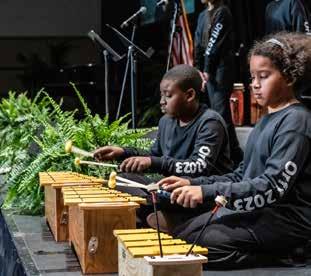

 Joani Slawson, President
Joani Slawson, President
Whatan amazing 2023 FMEA Professional Development Conference and All-State Concerts! In a world that seems tumultuous and uncertain, the FMEA conference was full of hope and inspiration. I was so impressed with the outstanding musicianship in the All-State Elementary Chorus and the All-State Elementary Orff Ensemble and the amazing work of the conductors. Thank you, Sophie Papoulis, Chris Judah-Lauder, and Karen Benson. Thank you, teachers, for preparing your students so well.
There were also many excellent sessions to attend. It was a joy to watch teachers sing, play, and dance together. On Saturday morning, when I attended a Dalcroze session, a hip-hop session, and a choral technique session all in row, I was in awe of the scope of music we teach in our classrooms. I truly hope you found what you needed to fill your soul and your teaching tool box.
A conference like this does not come together without the help and support of many people. Thank you to the FEMEA Board of Directors for all their hard work in preparing for and coordinating at the conference. Thank you to the amazing Jennifer Sullivan who works tirelessly behind the scenes to keep this organization moving forward. Thank you to the all-state coordinators, Lisa Hewitt, Rosemary Pilonero, Ruthie Antmann, and Alex Gartner. Their preparation and attention to detail ensured our smooth all-state events. Thank you to ALL our fabulous presenters. Thank you to West Music and Peripole for their support. Thank you, Pinellas County, for supplying instruments. Thank you to the FMEA Board of Directors and all the amazing people who work behind the scenes. Thank you to Kathy Sanz and Val Anderson for your dedication to the teachers and students of Florida. Finally, thank you to Dr. Shelby Chipman for your vision and leadership at this conference.
It’strue that every story has a lesson, but sometimes lessons become our story.
I recently had the amazing privilege of working with the Duval County middle school honor choir. One of the songs in our program was Things That Never Die by Victor C. Johnson, a lovely composition written for the Charles Dickens poem of the same name. Middle school
students are so precious. They are stuck in between being vulnerable and guarded. How could I encourage them to sing these notes, rhythms, and lyrics with conviction and carry the musical experience further than the performance? The answer to that question was meeting them with my own vulnerability. I needed to share my weakness in order for them to connect to the importance of the
Stemmer, Presidentlesson. In the poem there is a line that says, “Lose not a chance to waken love, be firm and just and true.”
Well, here we go …
Laurie Bitters, President

Iwouldlike to start out by thanking the performing groups and all-state coordinators that dedicated their time and efforts to prepare their students for such successful and memorable performances. On behalf of the FOA Executive Committee, we would like to thank our coordinators: Jarrod Koskoski, William Sanderson, Mary Lubaroff, Katherine Ng, and Andrea Szarowicz.
This article is supposed to be about our reflections on the conference. Unfortunately, I was not able to attend the entire conference. I made it one day and then became ill and tested positive for COVID. I would like to send many thanks to Cheri Sleeper, Valerie Terry, and Don Langland who jumped right in to make it all happen.

Since I was not able to be at the conference, I will focus on what I missed about being there:
w I missed the conversations and seeing colleagues from around the state.
w I missed interacting with my students who were in the all-state ensembles.
w I missed hearing what amazing things our conductors did with the students to create such fantastic performances.
w I missed going home more energized and excited about something I saw/ heard/learned. It is always such a great push to help get through the upcoming months.
As always, please feel free to contact any of us on the board with your questions or concerns. I wish you the very best on your district MPAs this year. Please take time to encourage your students to listen to the music beyond the page.
Years ago, I led the choir at my church. I was working on my master’s, had two small children, and was a full-time secondary choral music educator. I was exhausted all the time. As I left church one Sunday, my young son told me that he was thirsty and wanted to stop by the water fountain. When I looked at the water fountain that was directly in the path to my parking spot, I noticed a familiar choir member who was drinking water. I thought to myself, “I just want to go home. I do not want to have another conversation, and if I stop at the water fountain, I will have to wait even longer for my coveted Sunday afternoon nap.” I told my son that I would get him water on the way home, and I proceeded to my car. The very next Thursday, as I entered for church rehearsal, I was told the sad news that the choir member who had been at the water fountain that day had taken his own life. That was the day I learned to “Lose not a chance to waken love.” I don’t blame myself for what happened, but now I know the value of waking love.
It isn’t easy to air out our inadequacies, but if it inspires us and those around us to be the best versions of ourselves, then it is worth it. My best friend always reminds me that “perfect” should never be the objective. Keep learning and growing, and the world will be better because of it. As we all enter this MPA season, always remember to teach students, tell your stories, make music, and touch lives.
The Florida Music Education Association (FMEA) is soliciting scholarship applications for the June M. Hinckley Music Education Scholarship. The association will award $1,000 scholarships to selected 2022-23 graduating high school students who were accepted to a Florida all-state ensemble and who intend to major in music education at a Florida college or university.
How to Apply: Fill out the online application. As part of the online process, you will be asked to upload these files:
w Essay: Answer both of the following questions in a typed response of approximately 1,200 words saved as a Microsoft Word (.docx) or PDF (.pdf) file: (1) Why do you wish to become a music educator? (2) Why should music be available to all students?
w Three letters of recommendation signed and scanned as PDF files.
w High-quality headshot photograph such as your senior photo or similar. This will be published in the Florida Music Director magazine if you are one of the scholarship winners.
APPLY HERE
An OFFICIAL COPY of your transcript (must remain sealed) must be sent to the following address:
June M. Hinckley Music Education Scholarship
Attn: Val Anderson
402 Office Plaza Tallahassee, FL 32301
Postmark Deadline: April 22, 2023
Applications will be reviewed by a representative committee of teachers, administrators, and music educators convened by FMEA. Notification will be made by May 30, 2023. Monies awarded will be distributed to the appropriate college or university once the student is enrolled.
As arts education specialist for the Florida Department of Education, June Hinckley led the development of the Sunshine State Standards for the Arts, which are based on the National Arts Standards and were adopted by the Florida State Board of Education in 1996. Hinckley assisted schools and school districts with the implementation of the arts standards and with connecting the arts with the state accountability and testing program, and she served as a liaison among the various K-12 arts education groups, higher education, and community arts organizations. She was a founding organizer of the Arts for a Complete Education project, which has coalesced the various community, industry, and school arts organizations in Florida to work cooperatively and proactively to improve the quality and quantity of arts programs throughout the state.

Whata fabulous FMEA 2023! I enjoyed every minute of our conference in January. Hearing our award winners speak, meeting up with old and new friends, hearing outstanding musical performances, learning about new teaching technologies and strategies, hearing informed speakers, and celebrating our membership’s diversity during conference sessions all inspired me beyond measure. I am proud to be a member of FMEA and proud of what our organization offers its members at our annual conference. My column for this issue is conference inspired.
Without parent chaperones, FMEA AllState would not be possible. Chaperones are essential to ensure the safety and welfare of students while they are in rehearsals, at their hotel, and traveling to and from the concert venues. Participating as a chaperone is also educational for parents. Attending FMEA gives parents a view into the music classroom of their children. They have a better understanding of their child’s music curriculum, and they also get a closer look at the social lives of their children.
Parents with or without a musical background may be particularly interested in serving as chaperones at FMEA. The parent with a musical background may want to be a chaperone because they attended All-State themselves, or they just enjoy the music. The parent without a musical background perhaps wants to be a chaperone because they are curious. What is it about this music ensemble that is so appealing to my child? Serving as chaperones is also a way to observe their child interact with classmates and to get to know their
child’s teachers and other parents better.
Other than being an involved and concerned parent, a parent who is deaf may have additional reasons to attend FMEA All-State as a chaperone. Florida Music Director readers may have seen CODA, the 2022 Oscar winner for best movie about a young girl who is the only hearing member of a deaf family. In joining her high school’s choir, she finds herself drawn to her duet partner and her latent talent for music. Her parents and brother attend her school concert to better understand her newfound passion for singing. There is no sign language interpreter at the concert. The family looks around bewildered and appears uncomfortable.

At FMEA 2023, one of the parent chaperones for the All-State Orff Ensemble was deaf, and FEMEA requested that
the FMEA board provide an interpreter. Interpreters at musical events are becoming more common, but they are not always easy to secure, and they are not inexpensive. A minimum of two interpreters is required for continuous service of multiple hours. Why are teams of two interpreters required? Cetra Language Solutions (2012) explains:
Simultaneous interpreting demands so much concentration that even the most experienced professional can only hope to be effective for periods of 30 minutes or so. After that time, they will need to hand off to a fellow interpreter. They continue to follow the proceedings and prepare for their next shift. They might also assist their partner with key terminology, names, and crucial information. Simultaneous interpreting is complex

It is understandable that some people might ask, “Why have a sign language interpreter at a music concert?” Here are some responses from people who are deaf:
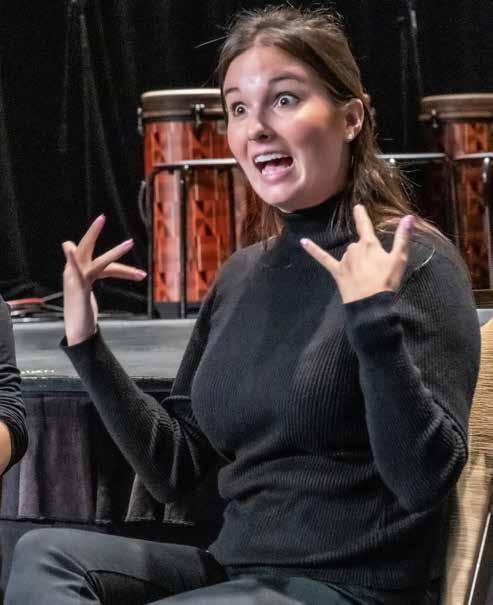
and demanding. It requires listening, understanding, sharp memory, accurate structure, inflection, and syntax, as well as a mastery of key terminology. Additionally, a command of two cultures is necessary to interpret idioms and address the audience in the correct tone of voice. You can imagine the mental fatigue an interpreter might go through while working, almost anticipating what the speaker will say next. Because simultaneous interpreting happens in real-time, there is no room for mistakes.
I am happy to report that the FMEA Executive Board stepped up and did provide an interpreter for all All-State Orff
Ensemble events. It was a serious commitment and one that should be commended, not only because of the financial obligation when resources are in short supply, but more importantly, because it signified FMEA’s continued commitment to diversity and inclusion. I am proud to be part of a board that is willing to make music accessible and open to all. FEMEA officers reported the parent chaperone had never felt more included in her child’s school events. Others in the audience reported how magical it was to see music interpreted into American Sign Language. As a result, I know that part of my future donations to FMEA will be designated for such accessibility expenses.
“There are a lot of hearing people who seem to think that deaf and hard of hearing people can’t enjoy music,” said Rachel Berman, a concertgoer who is deaf. “So to go to a concert with an interpreter provided, they give me the words, the accessibility,” said Berman. “That means that deaf and hard of hearing people can enjoy the music. It’s very visual. We can see it. Plus we’re provided the words through the interpreter. So overall, it’s just a different way of viewing and experiencing the music. But we still can enjoy it. It’s amazing. I’m able to be a part of the experience, right along with the other hearing people. I can hear the songs, the lyrics. I’m right there.” She pointed out that other concert goers may not hear a single note, but they can still feel the pounding rhythms. (Lill, 2019, para 1)
Darci Zook is deaf but her connection with sound is, well, loud and clear. “My ears and body pick up different sound waves, vibrations and low notes,” Darci says, explaining that her other senses are heightened by music. She also loves to study lyrics and analyze the creative metaphors of songs. (DeVault, 2019, para 1)
continued on page 58
Continued from page 57
Interpreters are not just interpreting the words. Musical interpreters must also convey instrumental music. They convey the tempo and the tone of the instrumental compositions by using sign language to explain the sounds coming from instruments. They can also convey the beat and emotion of the music using body language and facial expressions. Most people who are deaf have some residual hearing, so they are not without some access to the music. Instrumental music is usually louder than speech and incorporates a wider range of frequencies, making it easier to hear. Words are more difficult to understand.
Using ASL interpreters at your school concert will enhance the experience for all in attendance. It will also increase your audience attendance as people who are deaf are more likely to attend, as well as students in ASL classes. In 2001, the Florida Legislature passed a law making American Sign Language equal to all foreign language courses. ASL has become a popular option for high school world language graduation requirements. Many ASL learners are especially interested in learning to translate music.
ASL interpreters are professionals with varying levels of certification. There are specializations in government, legal, business, education, medical, insurance, or health care terminologies. There are also interpreters who specialize in music and theatrical performances. Following are helpful guidelines should you choose to provide interpreters at your school concert:
1. Hire professionals. There may be interpreters in your school district
who are willing to interpret your concerts for a supplement. They are not volunteers.
2. Enlist interpreter services at the beginning of the school year. Sign language interpreters are not always available. Even interpreters for the school district may be booked for other school events.
3. In promotions or flyers for the concert, indicate that interpreter services will be provided for the deaf and hard-of-hearing audience.
4. Give interpreters the music ahead of time so they can study the lyrics. Words sung are not as easy to comprehend as words spoken.
5. If possible, also give interpreters a recording of the concert music from a rehearsal. It is very helpful for interpreters to know the tempo and emotion of the music ahead of time.
6. Make sure the interpreters are easily seen by the audience while not interfering with the performers onstage.
7. Lights are usually dimmed at the time the concert begins. Make sure there is a spotlight on the interpreter.
8. If possible, a far corner of the stage is the best placement for an interpreter.
9. Some interpreters prefer a stool and a stand for the music, though others may prefer to stand and may not need the music if they have had it far enough ahead to know it well.
10. The backdrop for the interpreter can be the stage curtain if it is plain without busy detail.
11. Reserve seating for your deaf audience near the interpreter so they have a clear line of sight to the interpreter as well as to the performers.
12. Acknowledge the interpreter in your program and at the conclusion of the concert. Again, they are professionals who are enhancing your concert.
After all this work, expense, and preparation, what if no one who is deaf attends your concert? That will be unfortunate, but maybe a deaf parent, grandparent, friend, or neighbor will learn the concert was interpreted and decide to attend the next concert and bring his or her deaf friends. Maybe ASL students will want to become interpreters who specialize in musical performances. Or maybe a student who has a parent with hearing loss will be inspired to learn sign language, as I was after first seeing an interpreter work. At the very least, you will have given a clear signal that your program wants to make concerts accessible—even to those who may not hear every note.
References
CETRA Learning Solutions. (2012, July 13). Simultaneous interpreting: Why do I need two interpreters? Retrieved from https:// www.cetra.com/blog/simultaneousinterpretation-why-do-i-need-2-interpreters/ Lill, A. (2019, July 23). At concerts, American Sign Language interpreters translate more than lyrics. Retrieved from https://www.cpr. org/2019/07/23/sign-language-interpreterconcerts-red-rocks-colorado/
DeVault, N. (2019, July 30). ASL music interpreters amp up accessibility for the deaf community. Retrieved from https://www. ameridisability.com/asl-music-interpretersamp-up-accessibility-for-deaf-community/


There are three main leadership development opportunities within this program:
1. The Summer Drive-In to Leadership Conference will be offered on June 17, 2023, from 9:30 am to 4 pm at the University of Central Florida in Orlando. Attending this session is essential to participation in the Emerging Leaders program.
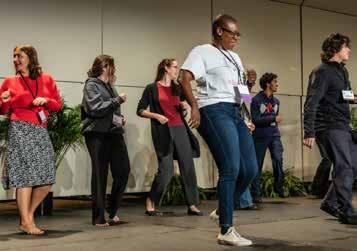
LEADERS are needed at all levels of our profession. The FMEA Emerging Leaders program has been designed to encourage and build leadership in the classroom, school, local community, school district, state, and beyond. We are proud of the committed, hardworking, and enthusiastic music teachers who have been and continue to be involved in the FMEA Emerging Leaders program.
This FMEA initiative provides support, guidance, and opportunity for outstanding music educators who demonstrate exemplary teaching as well as the potential and propensity for professional leadership. Teachers selected for participation in this program participate in a variety of leadership development opportunities to enhance and utilize their abilities in all aspects of music education.
Initiated in 2010, the program has served approximately 250 promising future education leaders. Each FMEA Emerging Leader is paired with an FMEA music educator/leader who serves as a mentor. Dr. Mary Palmer, professor emerita, University of Central Florida, and former dean of the UCF College of Education, serves as director of this program. Building skills for school-based, regional, state, and national leadership is the focus of this program. Developing advocacy skills to promote music and arts education is a central component of the program. The development of FMEA conference presentation skills is emphasized and exercised through the Pecha Kucha session in which Emerging Leaders share ideas as part of the annual FMEA conference. Networking and building relationships with local, state, and national leaders in music education are emphasized.
Emerging leaders are nominated and selected for participation in this program. They are successful music teachers, teaching at all levels of instruction and in all forms of music education. These teachers have been identified as emergent leaders with the potential for expanded leadership in music education in their schools, districts, state, and beyond.
2. Emerging Leaders will have two special sessions at the 2024 FMEA Professional Development Conference. The annual Coffee and Conversation time (on Thursday at 7:30 am, just prior to the first general session of the conference) provides an opportunity for Emerging Leaders to meet and talk informally with FMEA board members, conference presenters, and national (NAfME) leaders. On Friday afternoon, FMEA Emerging Leaders will have the opportunity to present their ideas in a Pecha Kucha format (not required of all Emerging Leaders).
3. Individual leadership mentors to coach, provide leadership pathways, and more will be available as needed, when possible. Occasional online coaching sessions will be offered. We invite school principals, district music leaders, FMEA leaders, and others to nominate candidates. Teachers also are welcome to self-nominate. The application/nomination form is available on the FMEA website (FMEA.org); go to Programs and scroll to Emerging Leaders.
We look forward to welcoming YOU into the FMEA Emerging Leaders family.


The mission of The Florida Music Educators Association is to promote quality, comprehensive music education for all Florida students as a part of their complete education.
Itwas fantastic to see 15,000-plus participants, with 9,940 registered attendees and more than 5,000 additional concert audience members, who gathered in Tampa for the 2023 Florida Music Education Association Professional Development Conference and All-State Concerts. The success of the 2023 conference was due to the numerous hours that our board members, volunteers, and partners contributed under the leadership of Dr. Shelby Chipman, president; Jason Locker, president-elect; and Dr. Steve Kelly, immediate past president. In addition, the conference planning chairperson, Dr. John K. Southall, and members of the team did an outstanding job, working throughout the year to help FMEA prepare for the conference. There were so many highlights to the conference that it is impossible to share the name of each and every person deserving accolades. Great job, board members and volunteers!
In addition, I can’t overstate the work of the FMEA staff behind the scenes. Val Anderson, Dr. Josh Bula, and Jasmine Van Weelden worked tirelessly throughout the conference to ensure that everything went smoothly.

As the 2023 conference came to a close, we began preparing for the 2024 FMEA Professional Development Conference and AllState Concerts. The theme of the 2024 conference is Music E ducation Begins with ME. This includes MEmbership, MEaningful Music Making, MEntorship, MEntal Health, MEthods, MEdia, MEeting, MEssage, and MEmories. The conference is scheduled for January 10-13, 2024, in Tampa, Florida. Mark your calendars now. Session proposals and performance submissions are being accepted on the FMEA website. Please consider applying to be a presenter or to have your school ensemble perform at the 2024 conference.
Kathleen D. Sanz, PhDThank you to members who completed the online survey for our 2023 conference. The FMEA Board of Directors and Conference Planning Committee will work diligently and take into account your suggestions as we plan for next year.
The Emerging Leaders Summer Drive-In to Leadership Conference will be held June 17, 2023, in Orlando. The deadline to apply to be an Emerging Leader is April 23, 2023.
The Steel Band Festival will be held March 31-April 1, 2023. Please review information on the FMEA website for more information on how to participate.

The 2023 Florida Regular Legislative Session will begin on March 7, 2023, and is scheduled to end on May 5, 2023. FMEA is currently preparing our legislative platform. The FMEA Government Relations Committee is working to develop strategies as we review the bills being filed by Florida legislators.
For those members impacted by Hurricane Ian, please be sure to visit the FMEA website to apply for assistance. In addition to the assistance members can access via the online portal, Hal Leonard has graciously offered for music to be distributed to counties identified by FEMA as being highly impacted by the storm.

Have a great spring and a successful second semester.
Kathleen D. Sanz, PhD